


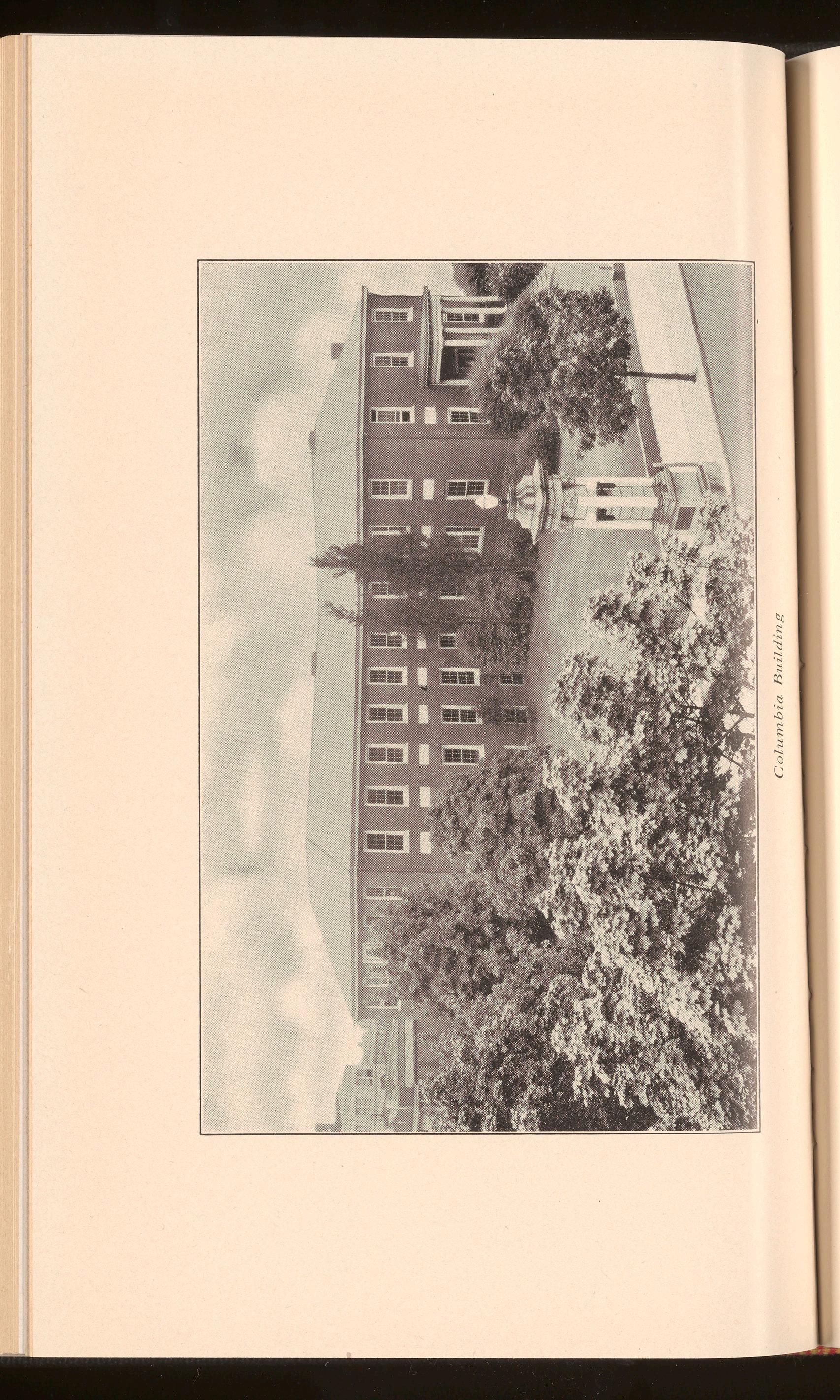





WITH ANNOUNCEMENTS FOR 1946-1947
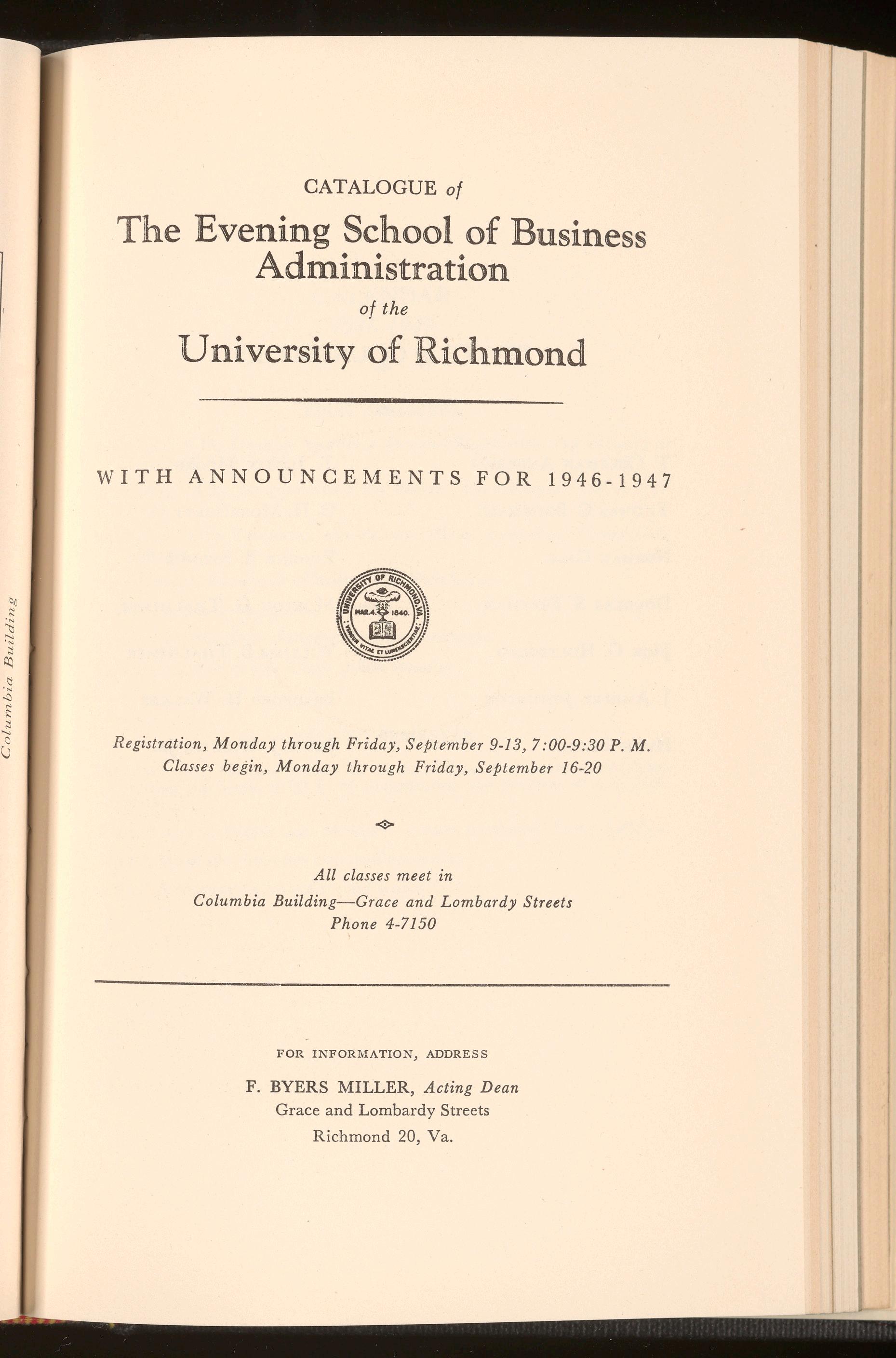
Registration, Monday through Friday, September 9-13, 7:00-9:30 P. M. Classes begin, Monday through Friday, September 16-20
All classes meet in Columbia Building-Grace and Lombardy Streets Phone 4-7150 FOR INFORMATION , ADDRESS
F. BYERS MILLER, Acting Dean Grace and Lombardy Streets Richmond 20, Va.
T. COLEM A N ANDREWS
THOI\IAS C BousHALL
NORMAN CALL
DO U GLAS s . FREEMAN
JACK G. HOLTZCLAW
j. AMBLER JOHNSTON
HUGH LEACH
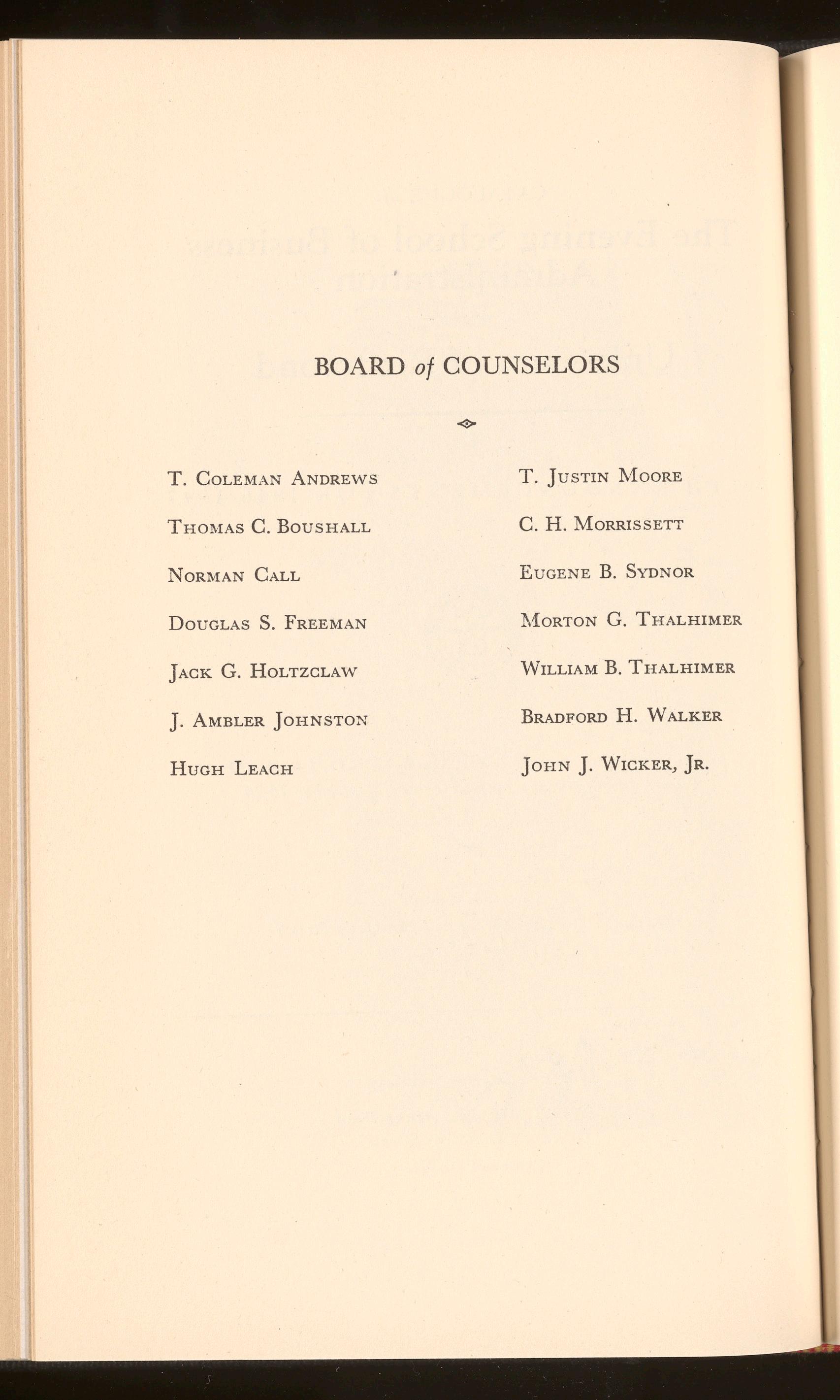
T JUSTIN MOORE
C H. MORRISSETT
EUGENE B. SYDNOR
11oRTON G . THALHIMER
WILLIAM B. THALHIMER
BRADFORD H w ALKER
JOI-IN J. WICKER, JR.
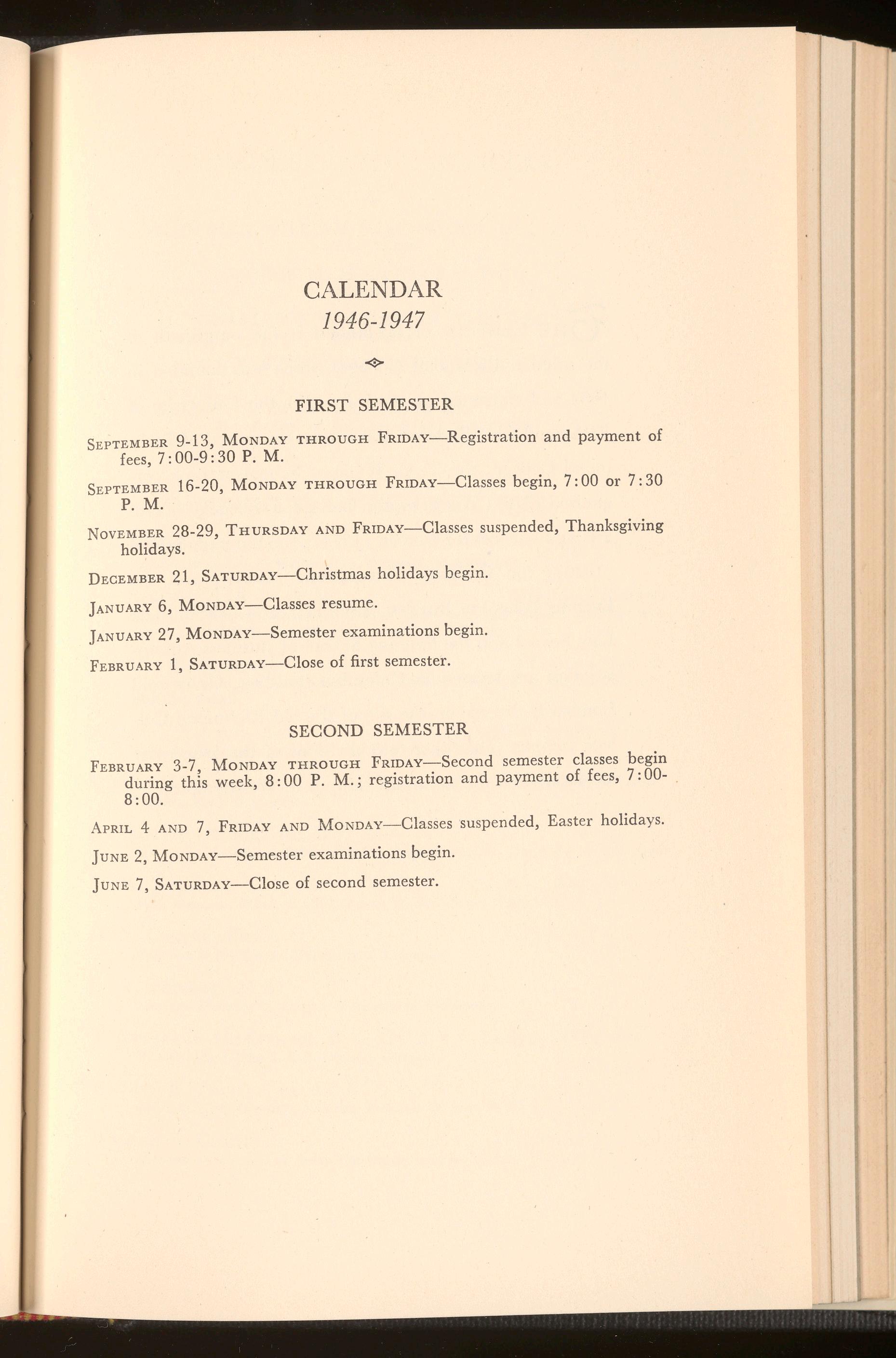
SEPTEMBER9-13, MONDAY THROUGH FRIDAY-Registration and payment of fees, 7: 00-9: 30 P. M.
SEPTEMBER 16-20, MoNDAY THROUGH FRIDAY-Classes begin, 7: 00 or 7: 30 P. M.
NovEMBER 28-29, THURSDAY AND FRIDAY-Classes suspended, Thanksgiving holidays.
DECEMBER21, SATURDAY-Christmas holidays begin.
JANUARY6, MONDAY-Classes resume.
JANUARY27, MONDAY-Semester examinations begin.
FEBRUARY1, SATURDAY-Close of first semester.
FEBRUARY3-7, MONDAY THROUGH FRIDAY-Second semester classes begin during this week, 8: 00 P. M.; registration and payment of fees, 7: 008: 00.
APRIL 4 AND 7, FRIDAY AND MoNDAY-Classes suspended, Easter holidays.
JUNE 2, MONDAY-Semester examinations begin
JUNE 7, SATURDAY-Close of second semester.
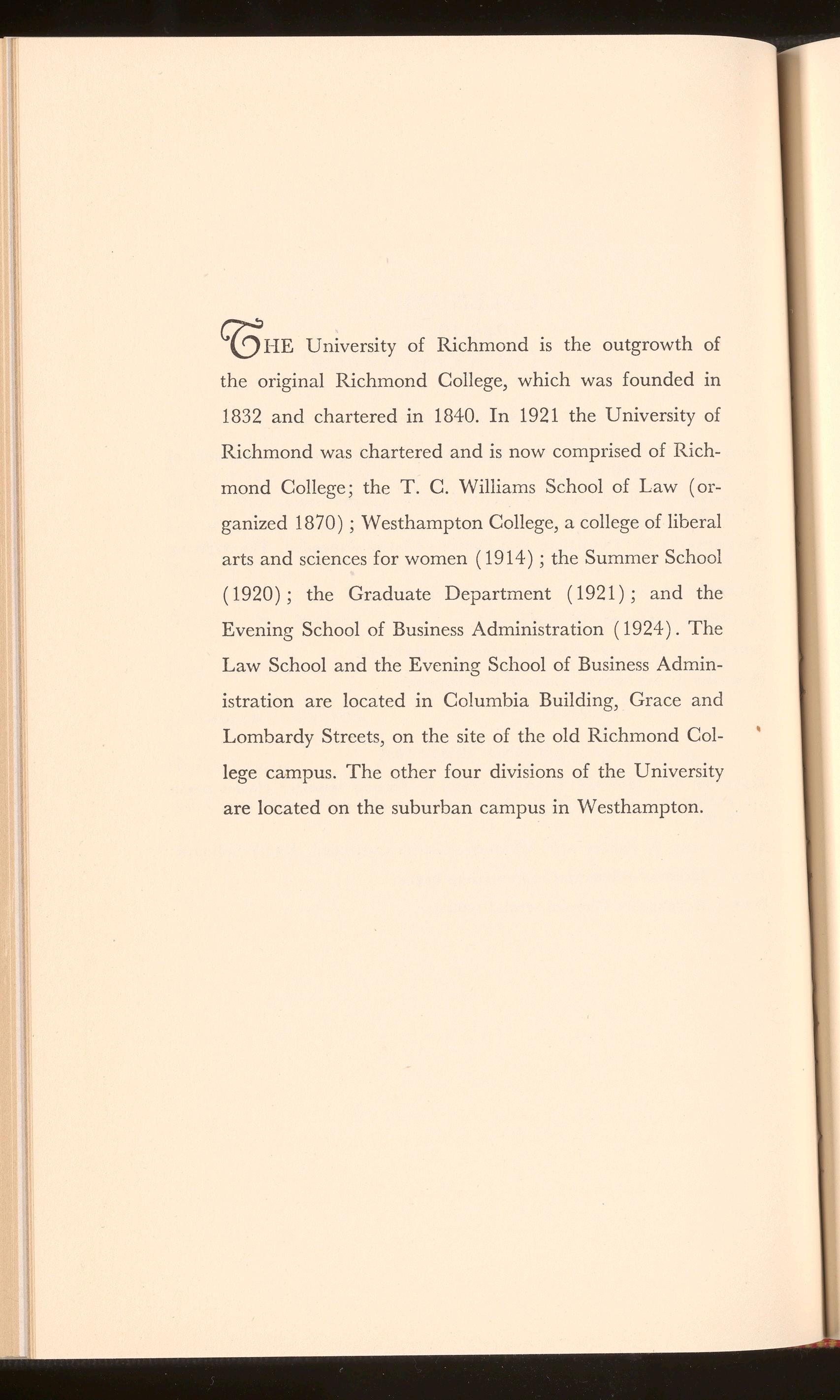
~HE University of Richmond is the outgrowth of the original Richmond College, which was founded m 1832 and chartered in 1840. In 1921 the University of Richmond was chartered and is now comprised of Richmond College; the T. C. Williams School of Law ( organized 1870) ; Westhampton College, a college of liberal arts and sciences for women ( 1914) ; the Summer School (1920); the Graduate Department (1921); and the Evening School of Business Administration ( 1924) . The Law School and the Evening School of Business Administration are located in Columbia Building, Grace and Lombardy Streets, on the site of the old Richmond College campus. The other four divisions of the University are located on the suburban campus in Westhampton.

FREDERICK WILLIAM BOATWRIGHT, M.A., LL.D. CHANCELLOR
GEORGE M. MODLIN, M.A., Ph.D. PRESIDENT
CHARLES H. WHEELER, III, Ph.D., D.Sc. TREASURER
F. BYERS MILLER, B.S., M.B.A. ACTING DEAN
M. RUTH SMITH, B.A.
SECRETARY TO THE DEAN AND REGISTRAR
LEROY BABCOCK, B.Eo., M.S. Mathematics Assistant Professor of Mathematics, University of Richmond.
F. J. BARNES, II, A. B., A. M.
Effective Speaking Executive Secretary, Richmond Citizens Association, Inc.; formerly Assistant Pro.. fessor of Political Science, Washington and Lee University.
JACK H. BASKERVILLE
Trusts I and II Graduate A.LB. and Graduate School of Banking. Trust Officer, First & Merchants National Bank.
HAROLD I. BAUMES, B.A. Municipal Administration Executive Secretary, League of Virginia Municipalities.
ROBERT M. BERKELEY, B.S. Consumer Credit Cashier, Bank of Virginia.
WILLIAM W. BROCK, JR., B.S., M.A. Economics Instructor, Richmond Public Schools-Summer Faculty, University of Richmond.
W. W. BRYAN Salesmanship Sales Manager, Standard Oil Company of New Jersey, Virginia Division.
M. E. CARVER, PH.D. Business Psychology Professor of Psychology, University of Richmond.
w. F. CAYLOR, M.A. Spanish Associate Professor of Spanish, University of Richmond.
R. BENJAMIN CHEATHAM, B.A., C.P.A. Business Management Vice President, The T. & E. Laundry Company.
WILLIAMS. CuoLIPP, JR., LL.B.
Business Law Assistant City Attorney; Associate Professor of Law, T. C Williams Law School.
WARREN F. CURTIS . . Property Insurance Member of the firm of Boswell & Curtis; member of State Bar Association.
JOI-IN E. DAMEREL,A.B.
Personnel Dire ctor, Thalhimer Brothers, Inc.
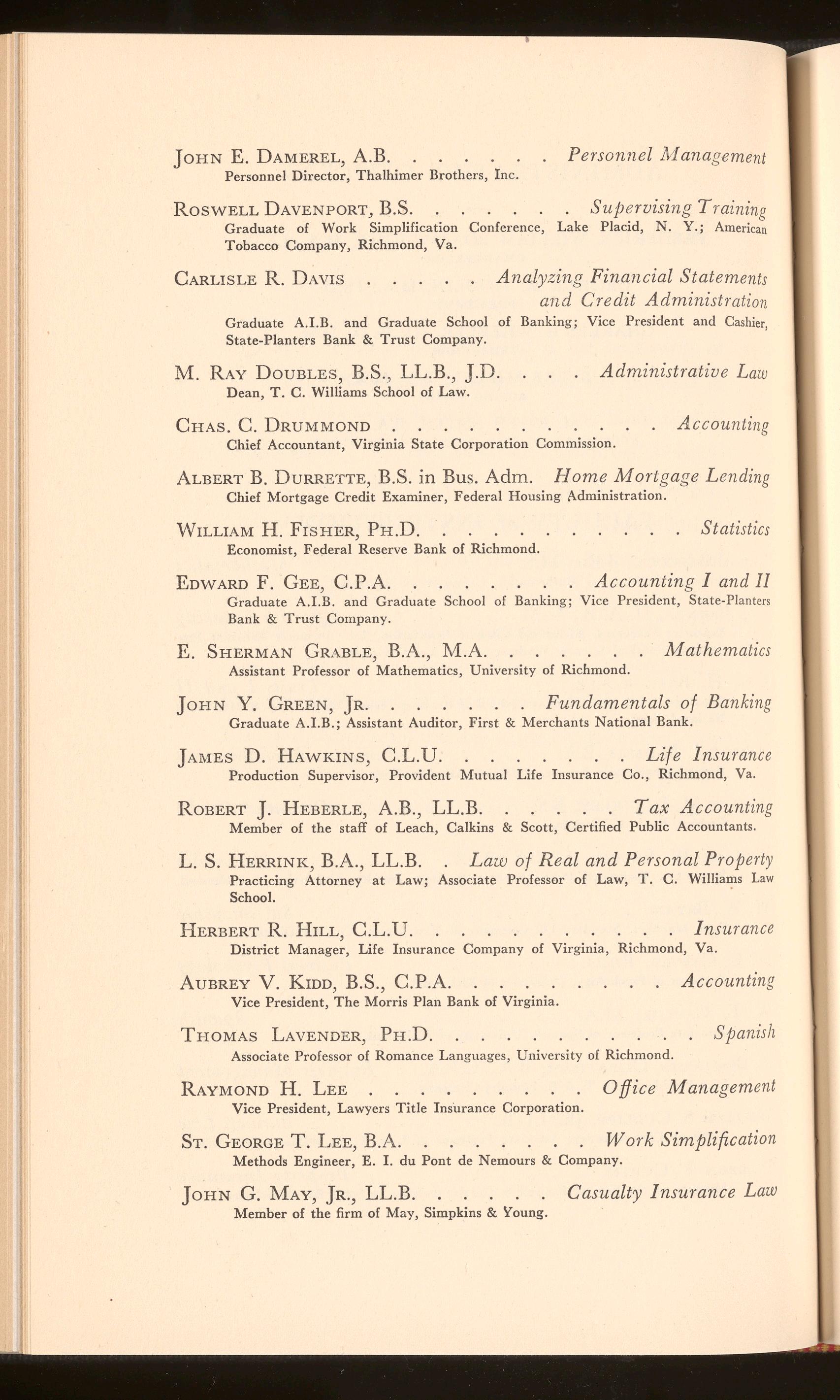
Personnel J.1ana ge ment
RoswELL DAVENPORT,B.S. . Sup e rvising Tra ining Graduate of Work Simplification Conference, Lake Placid, N. Y.; American Tobacco Company, Richmond, Va.
CARLISLER. DAVIS
Analyzing Financial Statements and Credit Administrat ion
Graduate A.LB. and Graduate School of Bankin g; Vice President and Cashier, State-Planters Bank & Trust Company.
M. RAY DOUBLES,B.S., LL.B., J.D. Administrative Law Dean, T. C. Williams School of Law.
CHAS. C. DRUMMOND Accounting Chief Accountant, Virginia State Corporation Commission.
ALBERTB. DuRRETTE,B.S. in Bus. Adm. Home Mortgage Lending Chief Mortgage Credit Examiner, Federal Housing Administration.
WILLIAMH. FISHER, PH.D. Statistics Economist, Federal Reserve Bank of Richmond.
EDWARDF. GEE, C.P.A.
Accounting I and II
Graduate A.LB . and Graduate School of Banking; Vice President, State-Pl anters Bank & Trust Company.
E. SHERMANGRABLE,B.A., M.A. Mathematics Assistant Professor of Mathematics, University of Richmond.
Jmrn Y. GREEN, JR. Fundamentals of Banking Graduate A.LB.; Assistant Auditor, First & Merchants National Bank.
JAMES D. HAWKINS, C.L.U. Life Insurance Production Supervisor, Provident Mutual Life Insurance Co., Richmond, Va.
ROBERTJ. HEBERLE, A.B., LL.B. Tax Account ing Member of the staff of Leach, Calkins & Scott, Certified Public Accountants
L. S. HERRINK,B.A., LL.B. Law of Real and Personal Property Practicing Attorney at Law; Associate Professor of Law, T. C. Williams Law School.
HERBERTR. HILL, C.L.U. Insurance District Manager, Life Insurance Company of Virginia, Richmond, Va.
AuBREY V. KmD, B.S., C.P.A. Accounting Vice President, The Morris Plan Bank of Virginia.
THOMAS LAVENDER,PH.D. Spanish Associate Professor of Romance Languages , University of Richmond.
RAYMOND H. LEE Office Managem ent Vice President, Lawyers Title Insurance Corporation.
ST. GEORGET. LEE, B.A. Work Simplification Methods Engineer, E. L du Pont de Nemours & Company.
JOHN G. MAY, JR., LL.B. Casualty Insuranc e Law Member of the firm of May, Simpkins & Young
E. F. MACDONALD, PH.D.
Economics Economist, Federal Reserve Bank of Richmond. Formerly Associate Professor of Economics, University of Richmond.
C. RoBERT McBRIER, B.S., C.P.A. Assistant Controller, Miller & Rhoads.
RALPH C. McDANEL, B.A., M.A., PH.D. Professor of American History, University of Richmond.
F. BYERS MILLER, B.S., M.B.A.
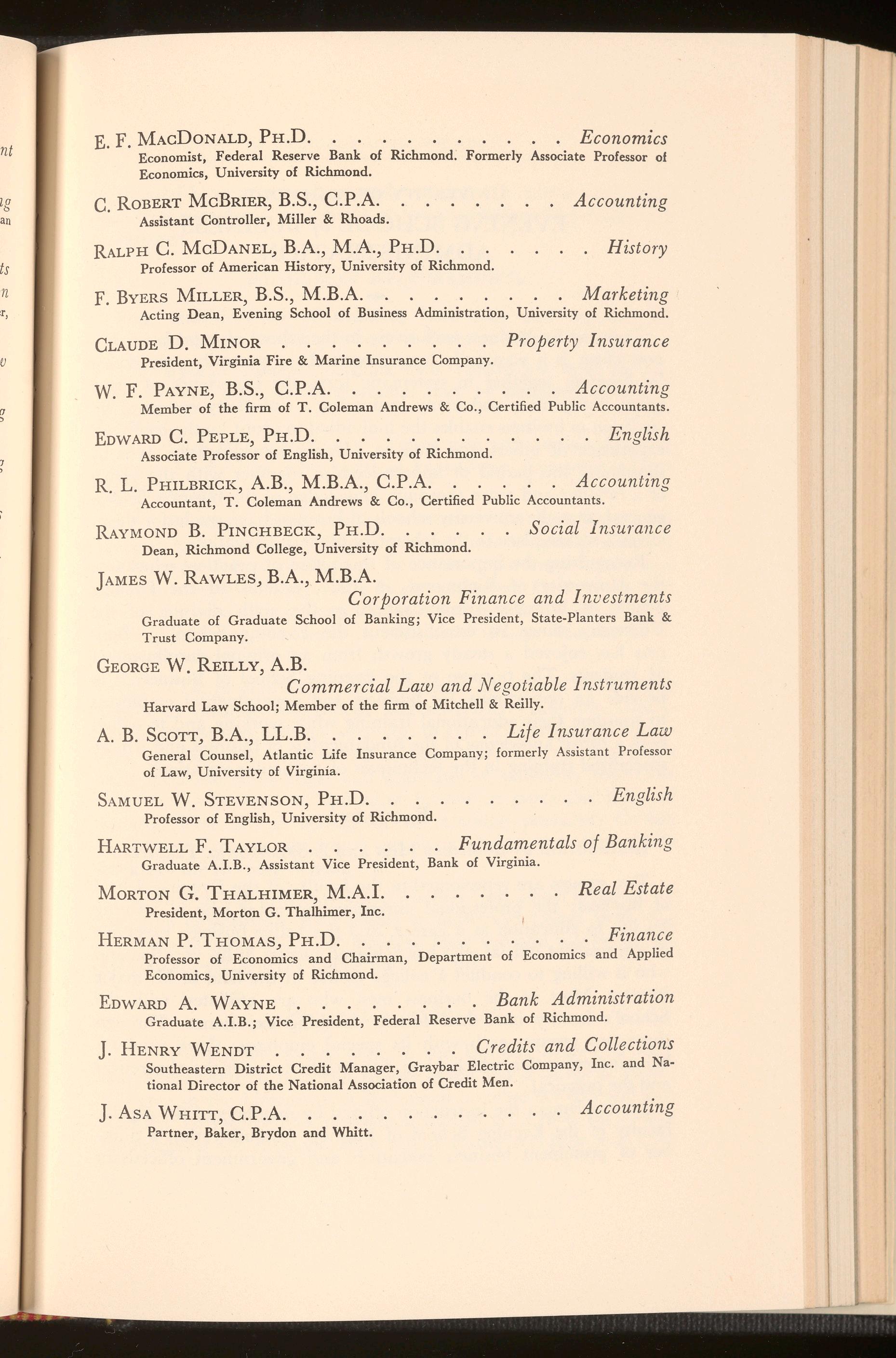
Accounting
History
Marketing
Acting Dean, Evening School of Business Administration, University of Richmond.
CLAUDE D. MINOR
Property Insurance President, Virginia Fire & Marine Insurance Company.
W. F. PAYNE, B.S., C.P.A.
Accounting Member of the firm of T. Coleman Andrews & Co., Certified Public Accountants.
EDWARD C. PEPLE, PH.D.
English Associate Professor of English, University of Richmond.
R. L. PHILBRICK, A.B., M.B.A., C.P.A.
Accounting Accountant, T. Coleman Andrews & Co., Certified Public Accountants.
RAYMOND B. PINCHBECK, PH.D.
Social Insurance Dean, Richmond College, University of Richmond.
JAMES w. RAWLES, B.A., M.B.A.
Corporation Finance and Investments
Graduate of Graduate School of Banking; Vice President, State-Planters Bank & Trust Company.
GEORGE w. REILLY, A.B.
Commercial Law and Negotiable Instruments Harvard Law School; Member of the firm of Mitchell & Reilly.
A. B. ScoTT, B.A., LL.B. Life Insurance Law General Counsel, Atlantic Life Insurance Company; formerly Assistant Professor of Law, University of Virginia.
SAMUEL w. STEVENSON, PH.D. English Professor of English, University of Richmond.
HARTWELL F. TAYLOR
Fundamentals of Banking Graduate A.I.B., Assistant Vice President, Bank of Virginia.
MORTON G. THALHIMER, M.A.I. Real Estate President, Morton G. Thalhimer, Inc.
HERMAN P. THOMAS, PH.D. Finance Professor of Economics and Chairman, Department of Economics and Applied Economics, University of Richmond.
EDWARD A. wAYNE Bank Administration Graduate A.I.B.; Vic,, President, Federal Reserve Bank of Richmond.
J. HENRY WENDT
Credits and Collections
Southeastern District Credit Manager, Graybar Electric Company, Inc . and National Director of the National Association of Credit Men
J. AsA WHITT, C.P.A.
Accounting Partner, Baker, Brydon and Whitt.

Training for business exclusively in the school of experience, it is now clear, is a wastefully long process. It is generally agreed that by bringing together in systematic form the experience of many years, many men, and many businesses, a university course of instruction in business enables the individual to profit by the combined experience of others and thus to advance more rapidly. It is by shortening the period of apprenticeship, together with the giving of a broader and more thorough knowledge of the business field in general, that the university schools of business have made for themselves a secure place in the scheme of modern education.
Recognizing the importance of this phase of practical education, the University of Richmond, in 1924, established the Evening School of Business Administration as the sixth division of the University. Since its establishment the Evening School of Business has enjoyed a steady growth from an original enrollment of 51 students. The purpose of the Evening School of Business is to provide an opportunity for business and governmental employees to continue their educational training while working and to obtain both a broad knowledge of the fundamentals of business and a more specialized training in the techniques of particular vocations.
INSTRUCTION BY BUSINESS MEN AND PROFESSIONAL TEACHERS
Two groups are represented in the faculty of the Evening School of Business: the professional university instructor who is devoting his life to education as a career, and the active business executive or government official who has achieved success in his vocation and who is willing to conduct a college course in the field of his major interest. Most of the business men who are affiliated with the School's faculty have had former teaching experience. Through these two groups, each with its special emphasis, there results a balanced education which gives due weight to both the theoretical and the practical.
To supplement the instruction offered by members of the regular faculty of the Evening School of Business Administration a number of prominent business executives and government officials in

Richmond have generously agreed to meet with various classes and give to the students the benefit of their specialized knowledge and experience.
Four classifications of students, both men and women, are admitted into the Evening School of Business Administration:
( 1) Special students. Adults over twenty-one years of age who are not high school graduates may be admitted as special students.
(2) High school graduates. Young men and women who have graduated from high school with at least fifteen approved units are eligible to enter.
(3) Present or former college students. To those young people who have attended college a year or more without graduating, the Evening School of Business offers an opportunity to continue their university training while being employed. Courses are also elected for credit by undergraduates now attending other divisions of the University, especially in Richmond College and the T. C. Williams School of Law.
(4) College graduates. Many students enrolled in the Evening School of Business are college and university graduates. Graduates of liberal arts colleges who wish to extend their general education, graduates of engineering colleges who wish to supplement their technical knowledge, and graduates of university schools of commerce who wish to specialize further in particular fields of activity, have found benefit in the training provided. College graduates who are seeking a graduate degree can also obtain credits in the Evening School.
Veterans of the armed services, whether high school graduates or not, who demonstrate their ability to undertake college work may enter the Evening School of Business. Most veterans will be eligible for educational benefits under the G. I. Bill.
Degree Program-Work done in the Evening School of Business Administration is of full college grade and is accepted toward a degree in the University of Richmond or other colleges and universities. To receive college credit a student must meet the college requirements for entrance, must attend classes regularly, and must
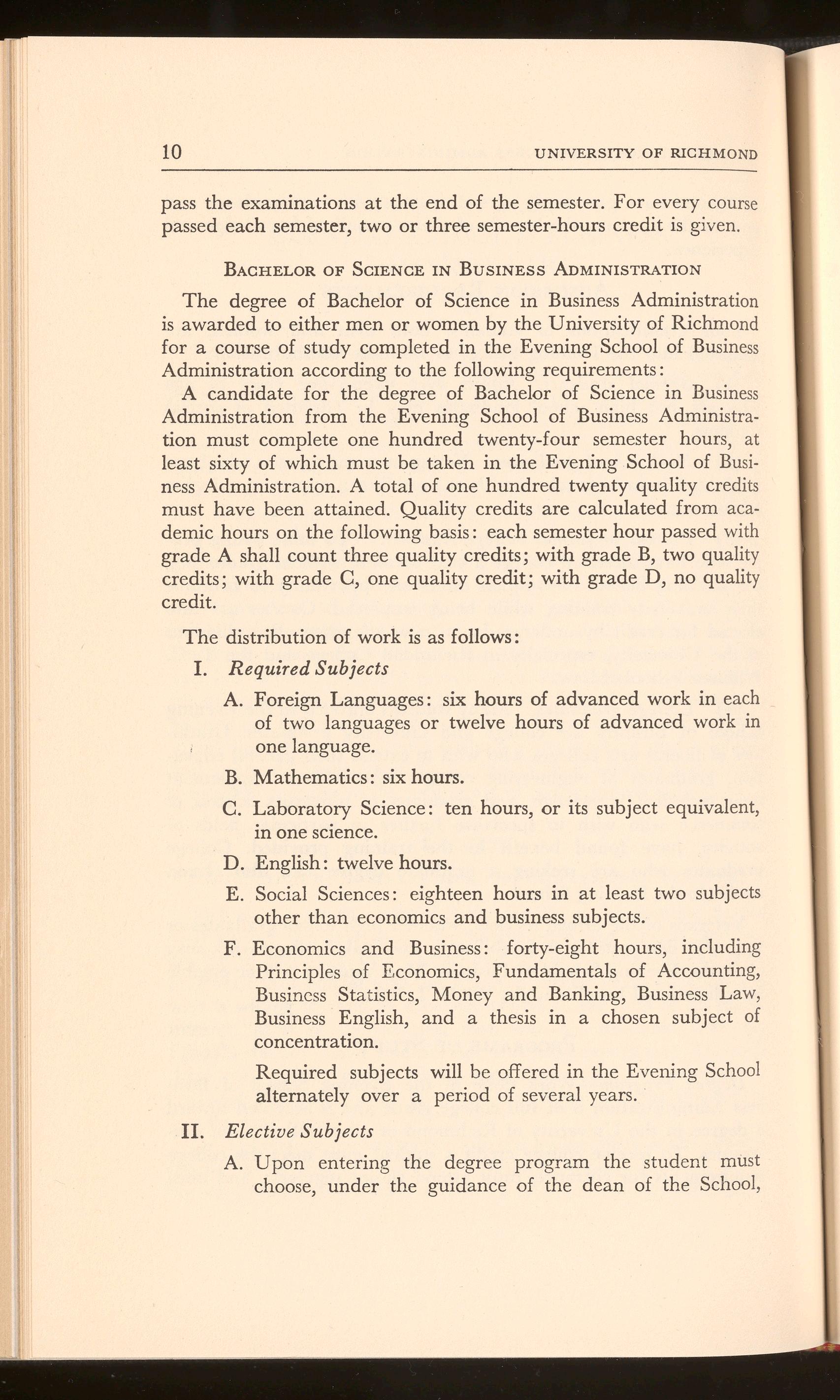
pass the examinations at the end of the semester. For every course passed each semester, two or three semester-hours credit is given .
The degree of Bachelor of Science in Business Administration is awarded to either men or women by the University of Richmond for a course of study completed in the Evening School of Business Administration according to the following requirements: A candidate for the degree of Bachelor of Science in Business Administration from the Evening School of Business Admini stration must complete one hundred twenty-four semester hours, at least sixty of which must be taken in the Evening School of Business Administration A total of one hundred twenty quality credits must have been attained. Quality credits are calculated from academic hours on the following basis: each semester hour passed with grade A shall count three quality credits; with grade B, two quality credits; with grade C, one quality credit; with grade D, no quality credit.
The distribution of work is as follows:
A. Foreign Languages: six hours of advanced work in each of two languages or twelve hours of advanced work in one language.
B. Mathematics: six hours.
C. Laboratory Science: ten hours, or its subject equivalent, in one science.
D. English: twelve hours.
E. Social Sciences: eighteen hours in at least two subjects other than economics and business subjects.
F. Economics and Business: forty-eight hours, including Principles of Economics, Fundamentals of Accounting, Business Sta t istics, Money and Banking, Business Law, Business English, and a thesis in a chosen subject of concentration.
Required subjects will be offered in the Evening School alternately over a period of several years.
A. Upon entering the degree progr am the student mu st choose, under the guidance of the dean of the School,
a field of concentration which will complete the fortyeight hours listed under F. Possible fields of concentration include accounting, banking, finance, merchandising, insurance, business management, and public administration.
B. The remaining hours required for the degree are elective, in either business or liberal arts subjects, and may be taken in the Evening School of Business Administration, in other divisions of the University, or transferred from other accredited collegiate institutions.
The degree of Master of Science in Business Administration is awarded to either men or women by the University of Richmond for a course of study completed in the Evening School of Business Administration according to the following requirements:
A candidate for the degree of Master of Science in Business Administration must complete twenty-seven semester hours of work in graduate or advanced undergraduate courses plus the master's thesis. No credit will be given for courses in which the student has a grade lower than B.
Classes which can be taken for graduate credit, with the permission of the dean, are designated by a star in the list of courses described in the catalogue. A student desiring to work for the degree of Master of Science in Business Administration should confer with the dean of the School.
Certificate Program-The University of Richmond will grant a Certificate in Business Administration or a Certificate in Public Administration to a student, admitted under any of the four classifications, who has successfully completed nine courses with a minimum of thirty-six semester hours of classroom work according to a prescribed program approved by the dean of the School. Several programs of concentration are offered, and a Certificate will be granted in the field of concentration selected. The curricula in the several fields are as follows:
Accounting
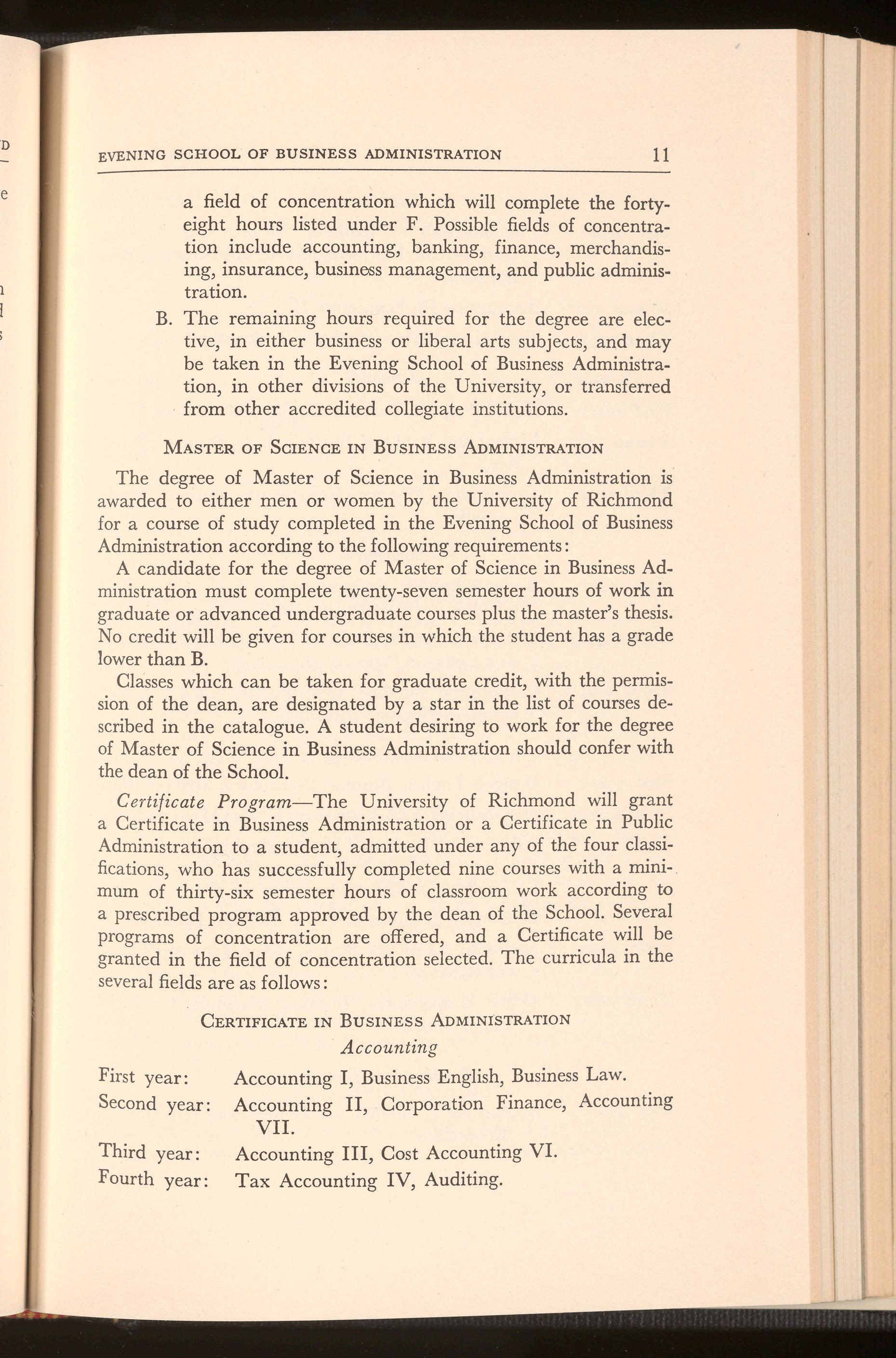
First year:
Second year:
Third year: Fourth year : Accounting I, Business English, Business Law. Accounting II, Corporation Finance, Accounting VII.
Accounting III, Cost Accounting VI. Tax Accounting IV, Auditing.
First year: Fundamentals of Banking, Money and Banking, Commercial Law, Negotiable Instruments, Economics I.
Second year: Accounting IB, Economics II.
Third year: Four electives to complete 12 semester hours.
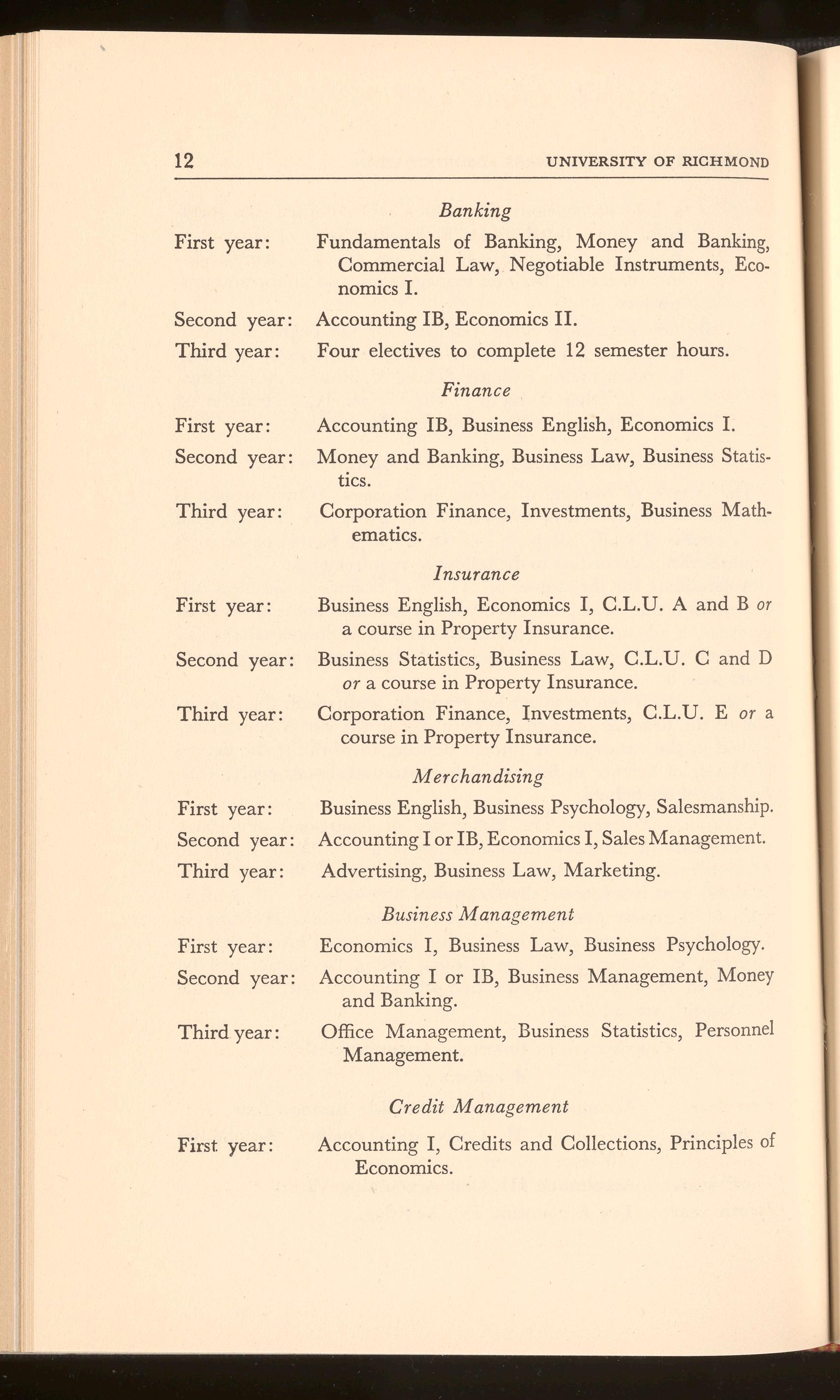
First year:
Second year:
Third year:
First year:
Second year:
Third year:
Accounting IB, Business English, Economics I. Money and Banking, Business Law, Business Stati stics.
Corporation Finance, Investments, Business Mathematics.
Business English, Economics I, C.L.U. A and B or a course in Property Insurance.
Business Statistics, Business Law, C.L.U. C and D or a course in Property Insurance.
Corporation Finance, Investments, C.L.U. E or a course in Property Insurance.
First year:
Second year:
Third year:
First year:
Second year:
Third year:
Business English, Business Psychology, Salesman ship .
Accounting I or IB, Economics I, Sales Management.
Advertising, Business Law, Marketing.
Busin ess Management
Economics I, Business Law, Business Psychology.
Accounting I or IB, Business Management, Mon ey and Banking.
Office Manag ement, Business Statistics, Personn el Management.
First year:
Accounting I , Credits and Collections , Prin ciple s of Economics.
Second year: Business Psychology, Commercial Law, Business Management, Effective Speaking.
Third year:

First year:
Second year :
Third year: I
Analyzing Financial Statements, Business Letter Writing, Money and Banking, Personnel Management.
CERTIFICATE IN PUBLIC ADMINISTRATION
Principles of Public Administration, Virginia Government and National Government, Business English.
Public Financial Administration, Governmental Accounting VII, Economics, Electives to complete ' 12 semester hours.
Public Reporting, Administrative Law, Electives to complete 12 semester hours.
A general curriculum in Business Administration may be composed of Business English, Business Law, Economics I, Accounting I or IB, and five electives to complete a minimum of thirty-six semester hours. Electives in any program may be chosen from other courses in the catalogue, subject to the approval of the dean. Although a specific number of years is indicated for a Certificate, the required work may be completed in a different sequence and in more or less time, depending upon the abilities and circumstances of the student.
Individual-Course Program-Many persons desire to enroll in individual courses for vocational or cultural value without regard to college credits or a certificate curriculum. Unless special training or prerequisite courses are necessary, all courses announced in this catalogue may be elected on an individual basis by students admitted under any of the four classifications.
A student following any of the four programs of study may elect one or more classes, according to his or her wishes and ability. Although it is possible to carry as many as five classes each semester, such a schedule would load a student to capacity and is recommended only to the most earnest and capable students.
The Evening School of Business has been established to provide the typ es of business training of college caliber required by those

persons in Richmond and vicinity unable to devote their full time to study. In seeking to achieve this end the School has obtained the advice of civic and business leaders of the community and has cooperated with local business organizations and governmental agencies in offering educational opportunities required by members of the various groups. The present curriculum of the School, in addition to courses for general business training, provides specialized programs of study for prospective students of law, for students of accountancy, for bank employees, governmental employees, insurance men, merchants, realtors, and others. Although many of these programs were suspended during the war, they will now be re-established as rapidly as returning servicemen and others indicate a need for the training.
earned by regular students in classes in the Evening School of Business Administration is accepted in fulfillment of requirements for entrance as a student in the Law School. A minimum of sixty semester hours of credit, completed with an average grade of "C", is required for admission to the Law School, and a student may satisfy this requirement most quickly in the Evening School by carrying five classes a week for two years. Pre-law students should confer with the dean to arrange an approved schedule of classes.
The laws of the State of Virginia require that applicants for admission to the bar shall have had (a) two years of college work (sixty semester hours) or its equivalent, and ( b) two years of law study in an accredited law school, or its equivalent. Law School classes are conducted in the morning.
Evening School of Business Administration has established a program of courses that will provide an opportunity for the employees of federal, state and municipal agencies to obtain additional education in the fields of their employment and thus prepare themselves for further professional advancement. The courses are taught by qualified experts in the various fields, and the subjects will be presented in a thoroughly practical, realistic manner. The program is designed, on the one hand, to provide an understanding of the fundamental principles and techniques of public administration and, on the other hand, to afford specialized training in specific fields which will increase the efficiency of the employee in his position. Such in-service training is being increasingly recognized by governmental agencies throughout the country as of inestimable value in raising the standards of public employment.
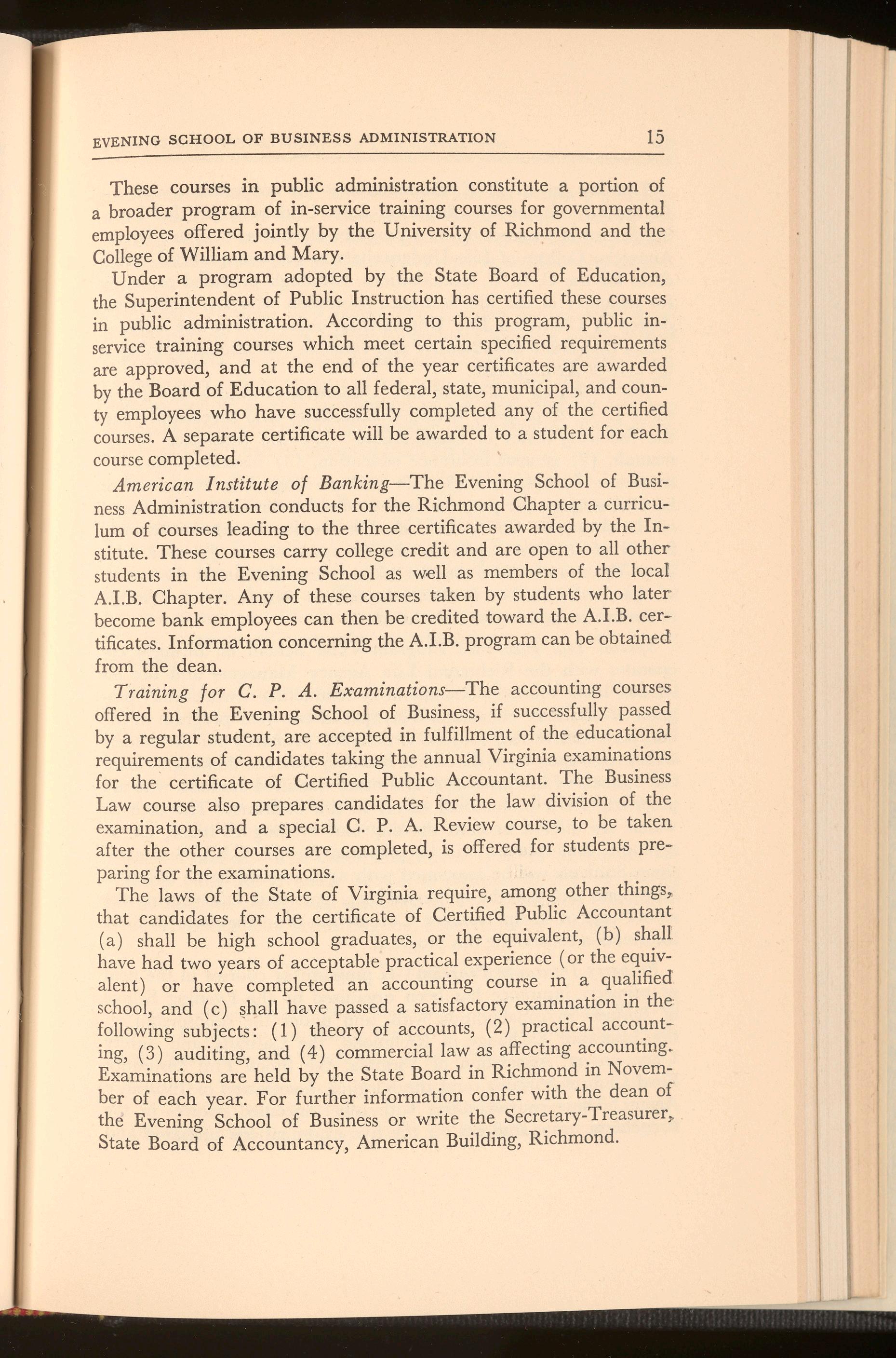
These courses in public administration constitute a portion of a broader program of in-service training courses for governmental employees offered jointly by the University of Richmond and the College of William and Mary.
Under a program adopted by the State Board of Education, the Superintendent of Public Instruction has certified these courses in public administration. According to this program, public inservice training courses which meet certain specified requirements are approved, and at the end of the year certificates are awarded by the Board of Education to all federal, state, municipal, and county employees who have successfully completed any of the certified courses. A separate certificate will be awarded to a student for each course completed.
American Institute of Banking-The Evening School of Business Administration conducts for the Richmond Chapter a curriculum of courses leading to the three certificates awarded by the Institute. These courses carry college credit and are open to all other students in the Evening School as well as members of the local A.LB. Chapter. Any of these courses taken by students who later become bank employees can then be credited toward the A.LB. certificates. Information concerning the A.LB. program can be obtained from the dean.
Training for C. P. A. Examinations-The accounting courses offered in the Evening School of Business, if successfully passed by a regular student, are accepted in fulfillment of the educational requirements of candidates taking the annual Virginia examinations for the certificate of Certified Public Accountant. The Business Law course also prepares candidates for the law division of the examination, and a special C. P. A. Review course, to be taken after the other courses are completed, is offered for students preparing for the examinations.
The laws of the State of Virginia require, among other things, that candidates for the certificate of Certified Public Accountant (a) shall be high school graduates, or the equivalent, (b) shall have had two years of acceptable practical experience ( or the equivalent) or have completed an accounting course in a qualified school, and (c) ~hall have passed a satisfactory examination in the · following subjects: ( 1) theory of accounts, (2) practical accounting, (3) auditing, and (4) commercial law as affecting accounting_ Examinations are held by the State Board in Richmond in November of each year. For further information confer with the dean of the Evening School of Business or write the Secretary-Treasurer, State Board of Accountancy, American Building, Richmond.

Training for C. L. U. Examinations-In cooperation with the Richmond chapter of Chartered Life Underwriters, the Evening School of Business offers a program of courses designed by the American College of Life Underwriters to prepare qualified candidates for the C. L. U. examinations. Although provided primarily for members of the life insurance profession who are seeking the degree of Chartered Life Underwriter, these courses are open to others who desire this intensive and valuable educational training in the field of life insurance.
The American College of Life Underwriters awards the degree of C. L. U. to properly qualified candidates who successfully pass the following series of examinations: ( 1) life insurance fundamentals, ( 2) general insurance education, ( 3) insurance law, (4) insurance finance, and ( 5) life underwriting. The examinations in these subjects are prepared and graded by the Examining Board of the American College of Life Underwriters, and the Evening School of Business supervises the examinations in June of each year. The examinations may be taken in installments at the option of the candidate. For further information consult the description of the courses and confer with the dean.
Special Life Insurance Program-The School of Business cooperates with the Richmond Life Agency Managers and life insurance home offices in Richmond in conducting a work-study program of insurance education. This special two-year program in life insurance and related subjects is designed primarily for life underwriters returning from the armed services, veterans desiring to enter the business of life insurance, and other qualified students who are preparing for a professional career in life insurance. The courses, which are offered in both the day and evening divisions, are so arranged that students will be prepared for the C.L.U. examinations. Students will be associated with agencies and home offices in Richmond and may be employed on a part-time basis during the school year or in the summer. Consult the dean for more detailed information concerning this program.
Property Insurance Program-A program of courses in the field of property insurance has been organized by the Evening School of Business in collaboration with, and under the sponsorship of, the Insura:nce Exchange of Richmond, the Casualty and Surety Underwriters' Association of Virginia, the Stock Fire Insurance Field Club of Virginia, and the Virginia Association of Insurance Agents. These courses, along with other specified courses in the curriculum, train students for the five examinations prepared and

graded each year by the American Institute for Property and Liability Underwriters and supervised in Richmond in June by the Evening School of Business. These examinations are taken by candidates seeking the degree of Chartered Property and Casualty Underwriter.
National Institute of Credit-The Evening School of Business Administration conducts for the Richmond Chapter a curriculum of courses leading to the three awards granted by the Institute. These courses carry college credit and are open to all other students in the Evening School as well as members of the local National Institute of Credit Chapter. Further information concerning the National Institute of Credit can be obtained from the dean.
Real Estate Program-A series of courses in real estate is offered by the Evening School of Business in cooperation with, and under , the supervision of, the Richmond Real Estate Exchange. Conducted by the Education Committee of the Exchange, the courses deal with the fundamental principles in the various branches of the real estate business. The program is organized mainly for persons connected with the profession of real estate, but the classes will be open to all who wish to take advantage of the training provided.
Office Management-The Richmond Chapter of the National Office Management Association sponsors a course of training for office employees and for persons who seek office employment. One of the functions of the National Association is to cooperate with business educational institutions in improving instruction in office occupations and procedures, and the School of Business Administration is glad to assist in this objective.
Sales Training-The Sales Executives Club of Richmond cooperates with the Evening School of Business in offering courses in the fields of selling and distribution, The Education Committee of the Club assists in organizing and supervising the classes.
Class Hours-Classes meet once each week, beginning at 7: 00 or 7: 30 P. M, and continuing for 100 or 150 minutes, unless stipulated otherwise in the description of particular courses.
Grading-The standing of students is indicated as follows: A ( 95-100%) excellent work; B ( 88-94%) very good work; C (80-87%) fair or average work; D (75-79%) just passing; E
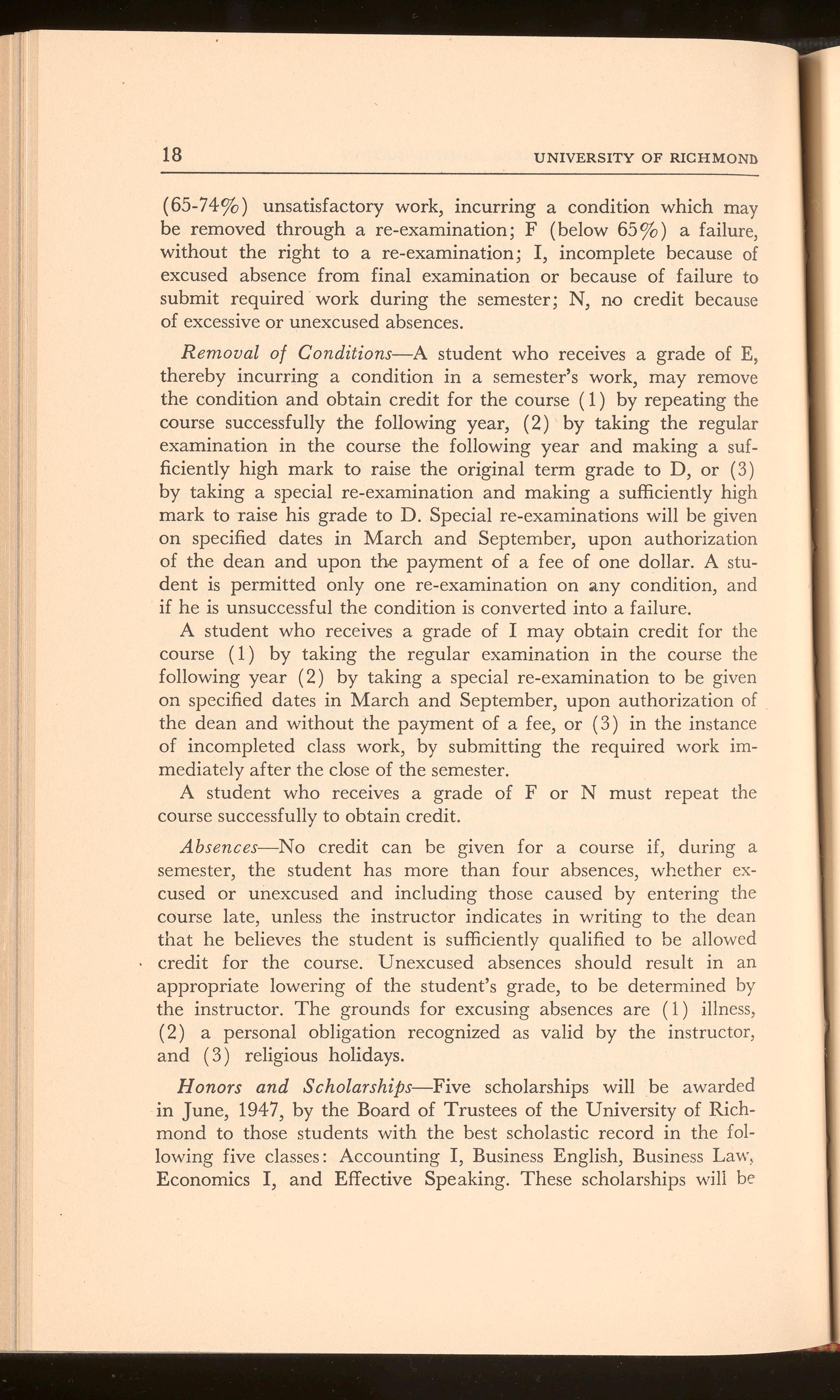
(65-74%) unsatisfactory work, incurring a condition which may be removed through a re-examination; F (below 65%) a failure, without the right to a re-examination; I, incomplete because of excused absence from final examination or because of failure to submit required work during the semester; N, no credit because of excessive or unexcused absences.
Removal of Conditions-A student who receives a grade of E, thereby incurring a condition in a semester's work, may remove the condition and obtain credit for the course ( 1) by repeating the course successfully the following year, ( 2) by taking the regular examination in the course the following year and making a sufficiently high mark to raise the original term grade to D, or (3) by taking a special re-examination and making a sufficiently high mark to raise his grade to D. Special re-examinations will be given on specified dates in March and September, upon authorization of the dean and upon the payment of a fee of one dollar. A student is permitted only one re-examination on any condition, and if he is unsuccessful the condition is converted into a failure.
A student who receives a grade of I may obtain credit for the course ( 1) by taking the regular examination in the course the following year ( 2) by taking a special re-examination to be given on specified dates in March and September, upon authorization of the dean and without the payment of a fee, or ( 3) in the instance of incompleted class work, by submitting the required work immediately after the close of the semester.
A student who receives a grade of F or N must repeat the course successfully to obtain credit.
Absences-No credit can be given for a course if, during a semester, the student has more than four absences, whether excused or unexcused and including those caused by entering the course late, unless the instructor indicates in writing to the dean that he believes the student is sufficiently qualified to be allowed credit for the course. Unexcused absences should result in an appropriate lowering of the student's grade, to be determined by the instructor. The grounds for excusing absences are ( 1) illness, ( 2) a personal obligation recognized as valid by the instructor, and ( 3) religious holidays.
Honors and Scholarships-Five scholarships will be awarded in June, 1947, by the Board of Trustees of the University of Richmond to those students with the best scholastic record in the following five classes: Accounting I, Business English, Business Law, Economics I, and Effective Speaking. These scholarships wili be
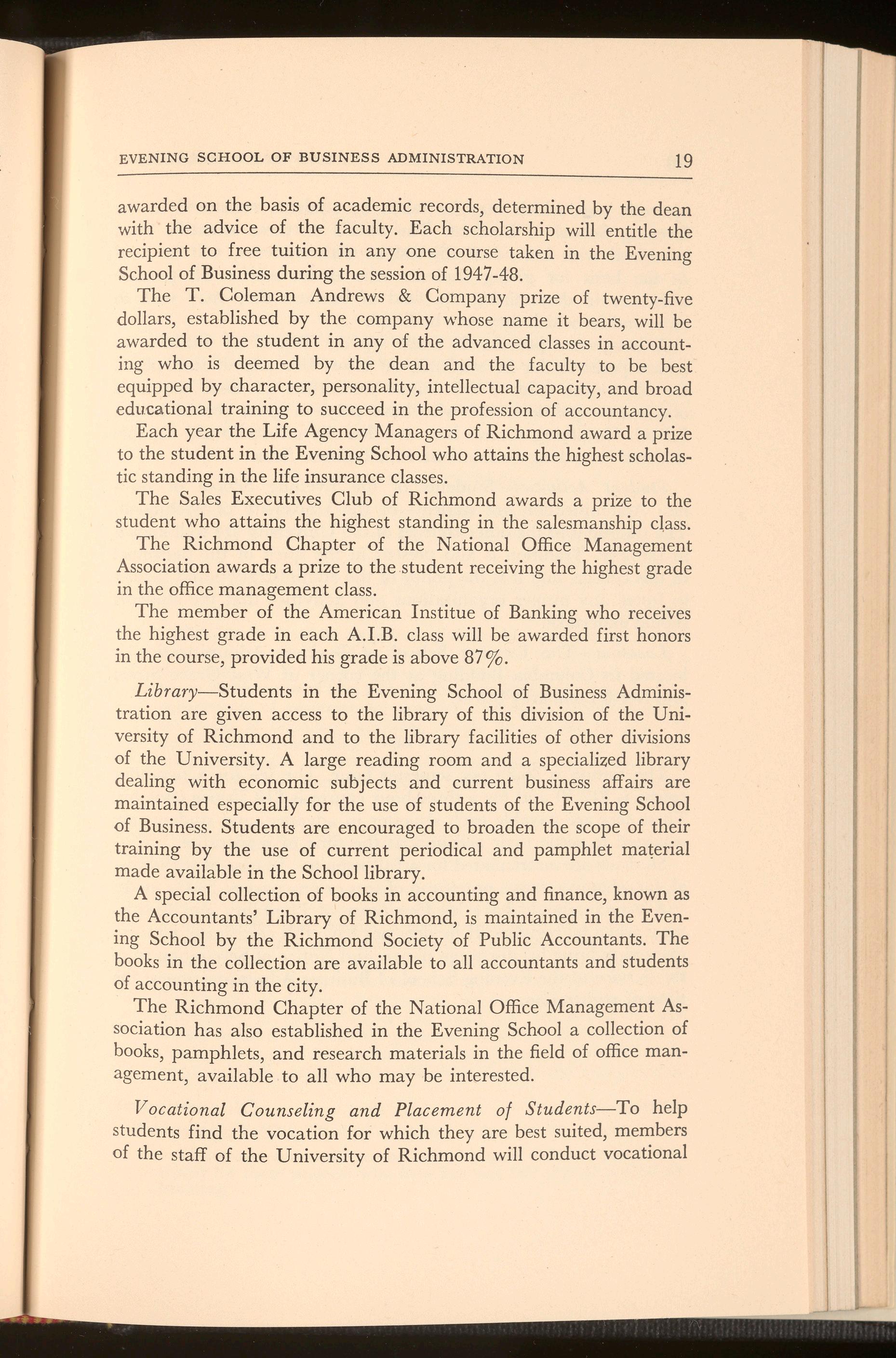
awarded on the basis of academic records, determined by the dean with the advice of the faculty. Each scholarship will entitle the recipient to free tuition in any one course taken in the Evening School of Business during the session of 1947-48.
The T. Coleman Andrews & Company prize of twenty-five dollars, established by the company whose name it bears, will be awarded to the student in any of the advanced classes in accounting who is deemed by the dean and the faculty to be best equipped by character, personality, intellectual capacity, and broad educational training to succeed in the profession of accountancy.
Each year the Life Agency Managers of Richmond award a prize to the student in the Evening School who attains the highest scholastic standing in the life insurance classes.
The Sales Executives Club of Richmond awards a prize to the student who attains the highest standing in the salesmanship class.
The Richmond Chapter of the National Office Management Association awards a prize to the student receiving the highest grade in the office management class.
The member of the American Institue of Banking who receives the highest grade in each A.I.B. class will be awarded first honors in the course, provided his grade is above 87%.
Library-Students in the Evening School of Business Administration are given access to the library of this division of the University of Richmond and to the library facilities of other divisions of the University. A large reading room and a specialized library dealing with economic subjects and current business affairs are maintained especially for the use of students of the Evening School of Business. Students are encouraged to broaden the scope of their training by the use of current periodical and pamphlet material made available in the School library.
A special collection of books in accounting and finance, known as the Accountants' Library of Richmond, is maintained in the Evening School by the Richmond Society of Public Accountants. The books in the collection are available to all accountants and students of accounting in the city.
The Richmond Chapter of the National Office Management Association has also established in the Evening School a collection of books, pamphlets, and research materials in the field of office management, available to all who may be interested.
Vocational Counseling and Placement of Students-To help students find the vocation for which they are best suited, members of the staff of the University of Richmond will conduct vocational

aptitude tests which may be taken by students registered in the Evening School of Business. The results of these scientific tests, combined with individual discussions with students, will be used as the basis for giving students who desire advice all possible assistance in determining the field of business they may wish to enter and for which they may be fitted.
Although no promise is made by the School of Business to secure positions for its students, an effort is made to find plac es for those who inform the School authorities of their desire to obtain new positions and who have made a good record in th e School. Gratifying success has attended the efforts to aid capabl e students in making connections with business firms.
Student Activities-Students of the Evening School of Business Administration are students of the University of Richmond . The traditions of the other colleges of the University are well kno wn in the city. Tradition is also present in the spirit of the personn el of this college, and it is the policy of the administration and facult y to foster any proper organizations and activities that the student s should undertake
Location-The Evening School of Business Administration is located in Columbia Building at the corner of West Grace Str eet and North Lombardy Street.
The tuition is $6 25 per semester hour. The .fee for a two-hour course is $12.50 and for a three-hour course is $18.75 per semester . These fees are payable each semester in advance, and students a re expected to settle their accounts at the time of registration.
Students are matriculated for a full semester . In case of withdrawal, for whatever cause, no refund of fees or any part of fees is mad e. A veteran should have his Certificate of Eligibility and Entitlement when he registers. If he does not have this certificate, he is requested to bring his discharge papers and Notice of Separation from the Service to the Evening School of Business Administration at th e time of registration.
The right is reserved to withdraw courses in which the enrollment is less than fifteen. Classes will be closed as soon as maximum enrollment is reached. Starred courses may be taken for graduate credit upon fulfilling additional requirements. Courses enclosed in brackets will not be offered in 1946-1947.
AccouNTING I, FuNDAMENTALS OF AccouNTING
Section ( 1), Tuesday, 7: 00-9: 30, both semesters. Six hours credit.
MR. PHILBRICK.
Section ( 2), Thursday, 7: 00-9: 30, both semesters. Six hours credit.
MR. KIDD.
This course provides an introduction to the science of accounting ( 1) for those who intend to prepare themselves for accountancy as a profession, ( 2) for those desiring the elements of accounting applicable in the practice of law, and ( 3) for those employed in the financial departments of governmental agencies. The study, though suited to the needs of beginners, advances rapidly through the principles of double entry bookkeeping to the construction of financial and operating statements. Interpretation of balance sheets and income statements of the sole proprietorship, the partnership, and the corporation will receive attention.
ACCOUNTING IB. GENERAL ACCOUNTING
Wednesday, 7 :00-9:30, both semesteu. Six hours credit.
MR. GEE.
This course provides a general knowledge of elementary accounting ( 1) for those employed in banks and other financial establishments, (2) for those seeking a general accounting foundation in the various fields of business administration, and ( 3) for those not contim~ing further with the study of accounting. In the first semester the basic principles of accounting are studied, including debit and credit, the keeping of double entry records, ledgers and journals, and the preparation of balance sheets and profit and loss statements. The second semester develops the principles of partnership and corporation account~ng, with a treatment of capital stock, surplus, dividends, reserves, bonds, sinking funds, statement analysis and interpretation.
AccouNTING IC
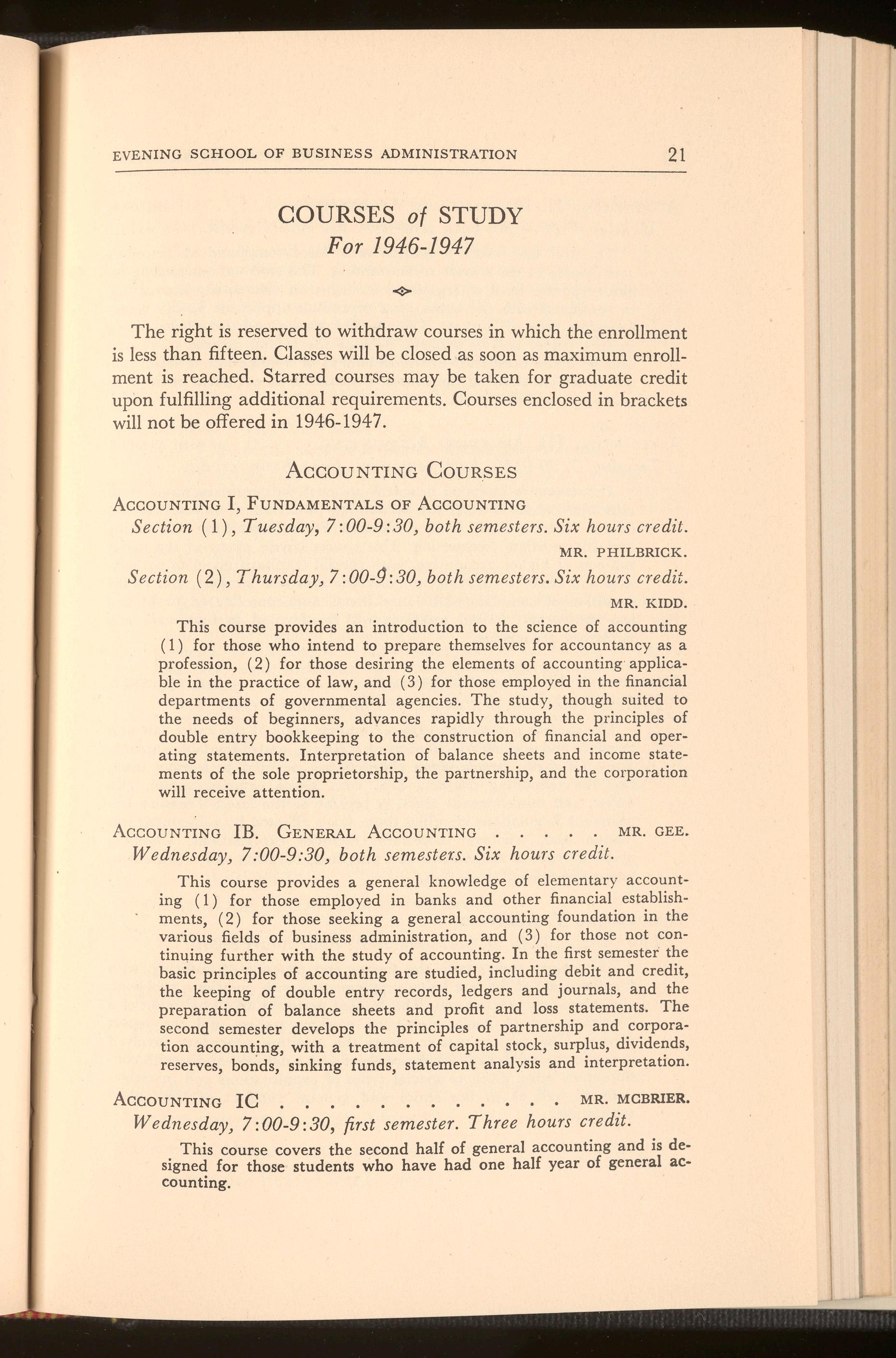
MR. MCBRIER.
Wednesday, 7:00-9:30, first semester. Three hours credit.
This course covers the second half of general accounting and is designed for those students who have had one half year of general accounting.
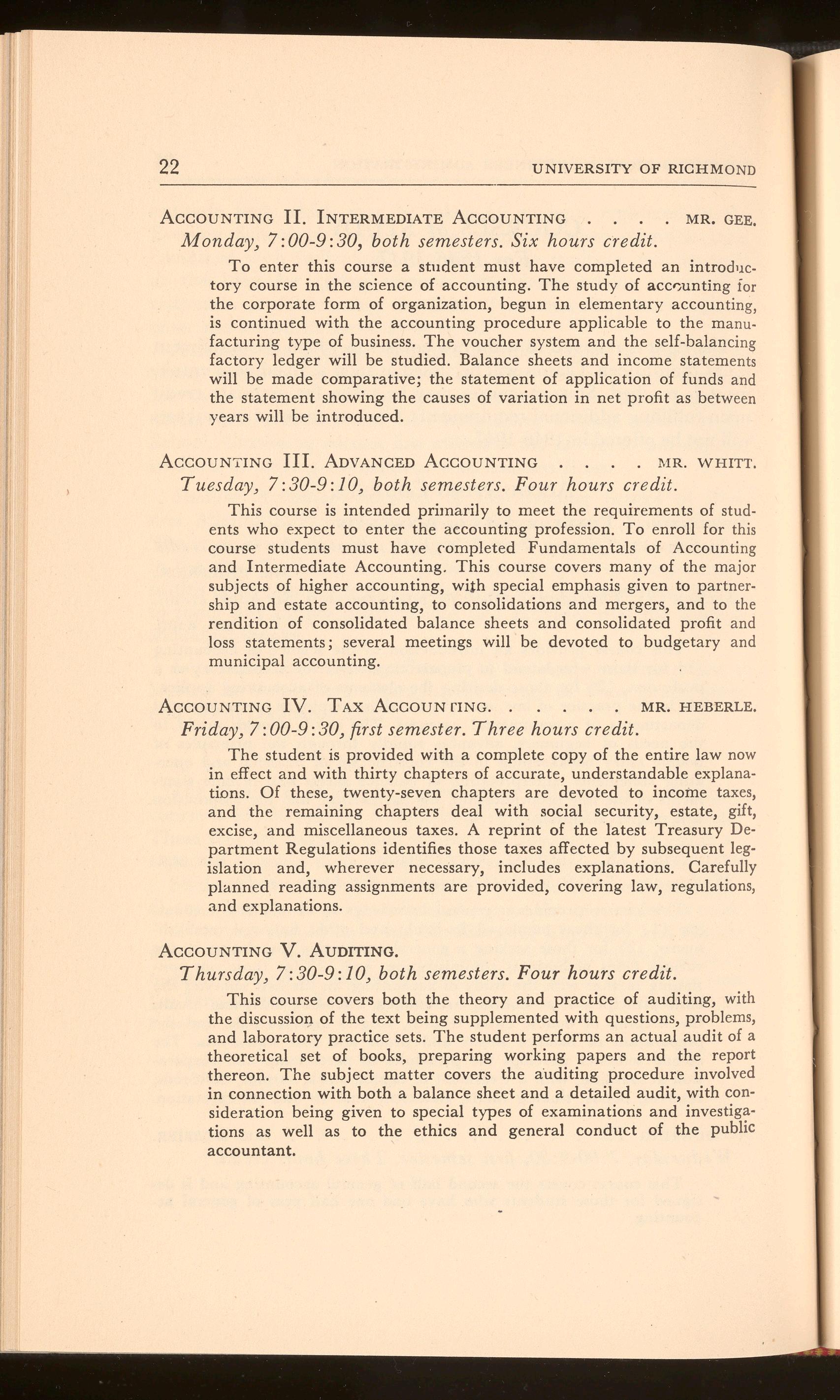
UNIVERSITY OF RICHMO ND
ACCOUNTING II. INTERMEDIATE ACCOUNTING
MR. GE E. Mon day, 7: 00-9: 30, both semesters. Six hours credit.
To enter this course a student must have completed an introd,1 ctory course in the science of accounting The stud y of accr,unting for the corporate form of organization, begun in elementary accounti ng, is continued with the accounting procedure applicable to the ma nufacturing t ype of business. The voucher system and the self-balan cing factory ledger will be studied. Balance sheets and income statem ents will be made comparative; th e statement of application of funds a nd the statement showing the causes of variation in net profit as betw een years will be introduced.
AccouN T ING III. ADVANCED AccouNTING
MR. WHIT T. Tuesday, 7 :30-9 : 10, both semesters. Four hours cre d it.
This course is intended primarily to meet the requir ements of st ude nts who expect to enter the accounting profession To enroll for th is course students must have completed Fundamentals of Accounti ng and Intermediate Accounting. This course covers many of the m a j or subjects of higher accounting, with special emphasis given to partn ership and estate accounting, to consolidations and mergers, and to the rendition of consolidated balance sheets and consolidated profit and Joss stat em e nts; several meetings will be devoted to budgetary and municipal accounting.
AccouNTING IV TAX AccouN rING.
MR. HEBER LE. Friday , 7: 00-9 :30, first semester. Three hours credit.
The student is provided with a complete copy of the entire law now in effect and with thirty chapters of accurate, understandable expl a nations. Of these, twenty-seven chapters are devoted to income t axes, and the remaining chapters deal with social security, estate, gift, excise, and mi scellaneous taxes A reprint of the latest Treasury D epartment Regulations identifies those taxes affected by subsequent legislation and, wherever necessary, includes explanations. Carefu lly planned reading assignments are provided, covering law, regulati ons, and explanations.
ACCOUNTING V. AUDITING.
Thursday, 7 :30-9 : 10, both semesters. Four hours credit.
This course covers both the theory and practice of auditing, wit h the discussion of the text being supplemented with questions, probl ems, and laboratory practice sets . The student performs an actual audit of a theoretical set of books, preparing working papers and the rep ort thereon. The subject matter covers the auditing procedure invol ved in connection with both a balance sheet and a detailed audit, with consideration being given to special types of examinatioris and investi gations as well as to the ethics and general conduct of the publi c accountant.
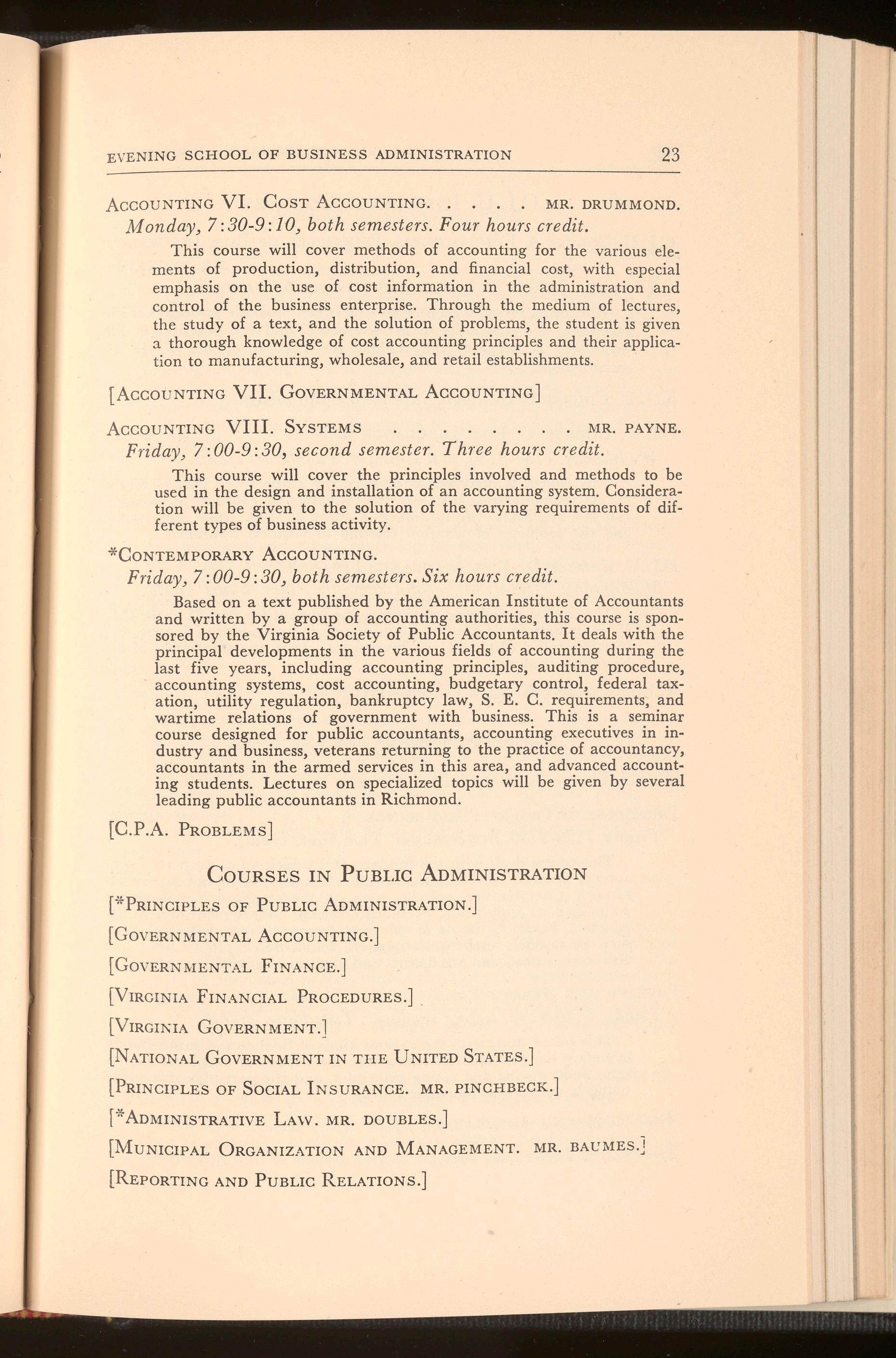
EVENING SCHOOL OF BUSINESS ADMINISTRATION 23
AccouNTING VI. CosT AccouNTING. MR. DRUMMOND. Monday, 7:30-9:10, both semesters. Four hours credit. This course will cover methods of accounting for the various elements of production, distribution, and financial cost, with especial emphasis on the use of cost information in the administration and control of the business enterprise. Through the medium of lectures, the study of a text, and the solution of problems, the student is given a thorough knowledge of cost accounting principles and their application to manufacturing, wholesale, and retail establishments.
[ AccouNTING VII. GovERNMENTAL AccouNTING]
AccouNTING VIII. SYSTEMS MR. PAYNE.
Friday, 7: 00-9: 30, second semester. Three hours credit. This course will cover the principles involved and methods to be used in the design and installation of an accounting system . Consideration will be given to the solution of the varying requirements of different types of business activity.
*CONTE MPORARY AccouNTING.
Friday, 7: 00-9: 30, both semesters. Six hours credit.
Based on a text published by the American Institute of Accountants and written by a group of accounting authorities, this course is sponsored by the Virginia Society of Public Accountants. It deals with the principal developments in the various fields of accounting during the last five years, including accounting principles, auditing procedure, accounting systems, cost accounting, budgetary control, federal taxation, utility regulation, bankruptcy law, S. E. C. requirements, and wartime relations of government with business. This is a seminar course designed for public accountants, accounting executives in industry and business, veterans returning to the practice of accountancy, accountants in the armed services in this area, and advanced accounting students. Lectures on specialized topics will be given by several leading public accountants in Richmond.
[C.P.A. PROBLEMS]
COURSES IN PUBLIC ADMINISTRATION
[;;PRINCIPLES OF PUBLIC ADMINISTRATION.]
[GovERNMENTAL AccouNTING.]
[GovERN!IIENTAL FINANCE.]
[VIRGINIA FINANCIAL PROCEDURES.]
[VIRGI!\IA GOVERNMENT .]
[NATIONAL GOVERNMENT IN TUE UNITED STATES.]
(PRINCIPLES OF SOCIAL INSURANCE. MR. PINCHBECK.]
[·*ADMINISTRATIVE LAW. MR. DOUBLES.]
[MUNICIPAL ORGANIZATION AND MANAGEMENT. MR. BAV!l1ES.J
[REPORTING AND PUBLIC RELATIONS.]
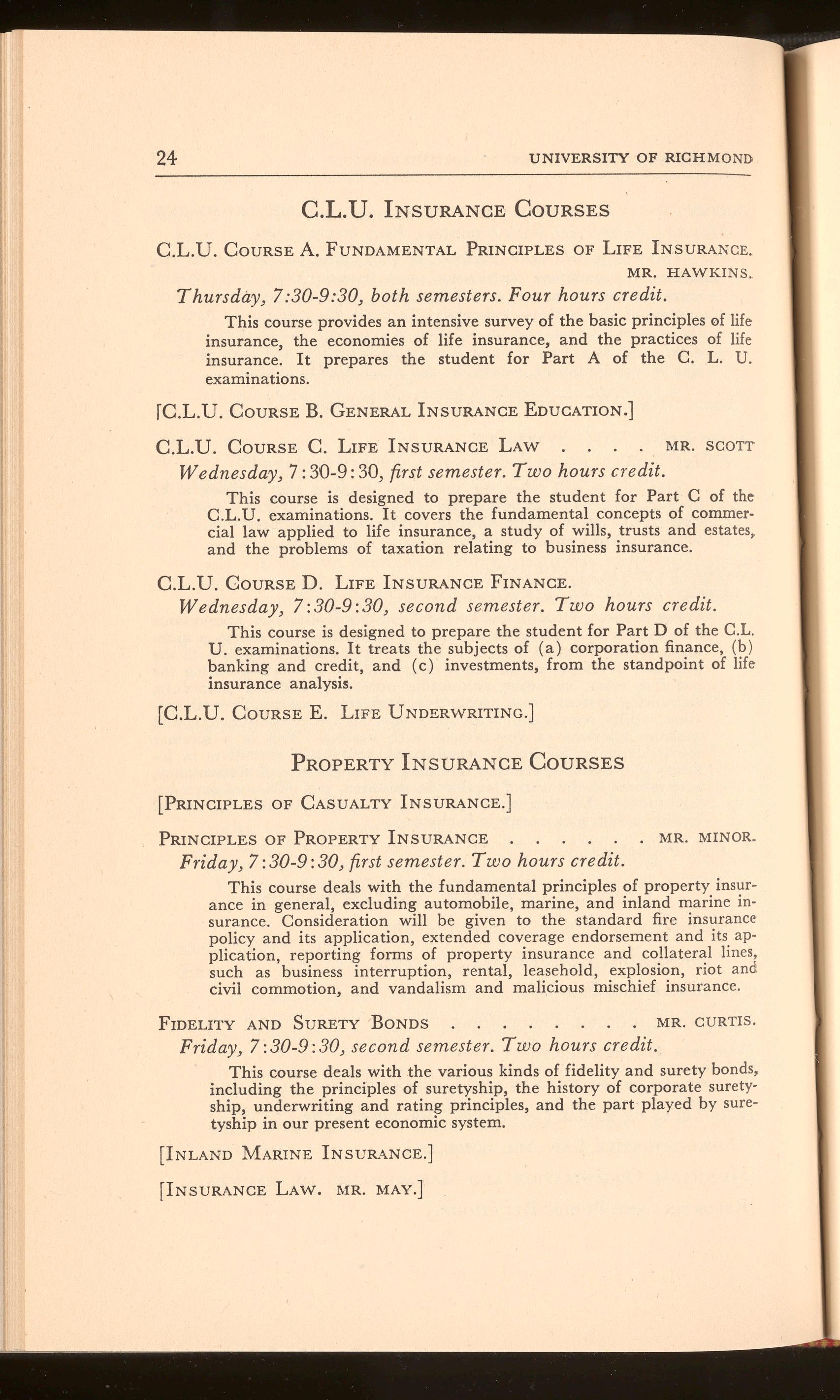
UNIVERSITY OF RICHMOND
C.L.U. COURSE A. FUNDAMENTAL PRINCIPLES OF LIFE INSURANCE MR. HAWKINS.
Thursday, 7:30-9:30, both semesters. Four hours credit.
This course provides an intensive survey of the basic principles of life insurance, the economies of life insurance, and the practices of life insurance. It prepares the student for Part A of the C. L. U. examinations.
rc.L.u. couRsE B. GENERAL INsuRANcE EDucATION.J
C.L.U. COURSE C. LIFE INSURANCE LAW MR. SCOTT
Wednesday, 7: 30-9: 30, first semester. Two hours credit.
This course is designed to prepare the student for Part C of the C.L.U. examinations. It covers the fundamental concepts of commercial law applied to life insurance, a study of wills, trusts and estates, and the problems of taxation relating to business insurance.
C.L.U. GouRsE D. LIFE INSURANCE FINANCE.
Wednesday, 7: 30-9 :30, second semester. Two hours credit .
This course is designed to prepare the student for Part D of the C.L. U. examinations. It treats the subjects of (a) corporation finance, (b) banking and credit, and (c) investments, from the standpoint of life insurance analysis.
[C.L.U. COURSE E. LIFE UNDERWRITING.]
PROPERTY INSURANCE COURSES
[PRINCIPLES OF CASUALTY INSURANCE.]
PRINCIPLES OF PROPERTY INSURANCE . MR. MINOR. Friday, 7:30-9:30, first semester. Two hours credit.
This course deals with the fundamental principles of property insurance in general, excluding automobile, marine, and inland marine insurance. Consideration will be given to the standard fire insurance policy and its application, extended coverage endorsement and its application, reporting forms of property insurance and collateral lin es, such as business interruption, rental, leasehold, explosion, riot and civil commotion, and vandalism and malicious mischief insurance.
FIDELITY AND SURETY BONDS MR. CURTIS. Friday, 7: 30-9: 30, second semester. Two hours credit.
This course deals with the various kinds of fidelity and surety bonds , including the principles of suretyship, the history of corporate surety• ship, underwriting and rating principles, and the part played by suretyship in our present economic system.
[INLAND MARINE INSURANCE.]
[INSURANCE LAW. MR. MAY.]
SCHOOL OF BUSINESS ADMINISTRATION
PRINCIPLES OF SALESMANSHIP. . MR. BRYAN.
Monday, 7:30-9:30, first semester. Two hours credit.
This course deals with the practical elements of salesmanship. Designed for the training of sales candidates and those now engaged in sales work. Subjects to be covered include analysis of qualifications of a successful salesman, development of sales territories, analysis of types of prospects, buying motives, planned sales presentations, the proper use of such sales tools as kits, demonstrations, and samples, converting objections into sales opportunities, closing the sale, handling complaints, and after-the-sale selling. Sponsored by the Sales Executives Club of Richmond.
SALES ADMINISTRATION AND MANAGEMENT.
Monday, 7:30-9:30, second semester. Two hours credit.'
This is an advanced course designed primarily for sales supervisors and managers and others preparing for supervisory positions. Among the subjects considered are sales research, sales department organization, recruiting salesmen, training and equipping salesmen, compensation, supervising salesmen, sales territories, travel expenses, sales quotas, costs and budgets, sales promotion and policies. Sponsored by the Salei. Executives Club of Richmond.
AoVERTISING.
Tuesday, 7: 30-9: 30, first semester. Three hours credit.
This course covers modern principles of advertising as they relate to local and national advertising. Special attention is directed to the study and preparation of local advertising, with emphasis on copy, layout, and general typography. All classes of advertising media are treated, including magazine, newspaper, trade paper, billboard, radio, and direct mail. Field trips are made to advertising offices, newspaper plants, outdoor advertising plants, printing establishments, and radio stations.
*PRINCIPLES OF MARKETiNG
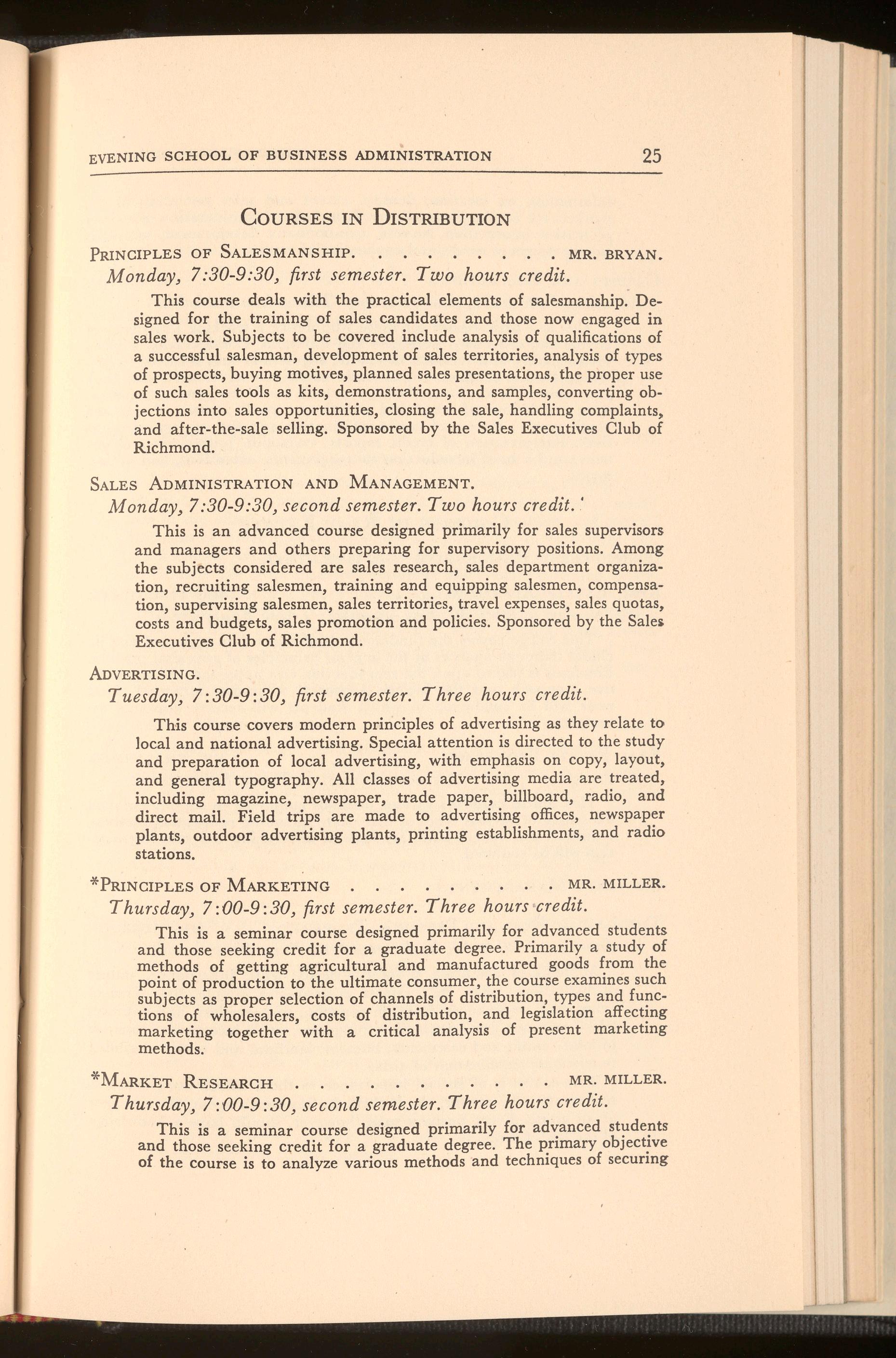
MR. MILLER.
Thursday, 7:00-9:30, first semester. Three hours credit.
This is a seminar course designed primarily for advanced students and those seeking credit for a graduate degree. Primarily a study of methods of getting agricultural and manufactured goods from the point of production to the ultimate consumer, the course examines such subjects as proper selection of channels of distribution, types and functions of wholesalers costs of distribution, and legislation affecting marketing together 'with a critical analysis of present marketing methods.
*MARKET RESEARCH
MR. MILLER.
Thursday, 7:00-9:30, second semester. Three hours credit.
This is a seminar course designed primarily for advanced students and those seeking credit for a graduate degree. The ~rimary objectfve of the course is to analyze various methods and techmques of securing
UNIVERSITY OF RICHM OND
information on location, density, extent and sales potentials of the markets for various commodities. It includes a consideration of sources of market information, surveys , questionnaire development, sampli ng interpretation of results and application of results '
CREDITS AND COLLECTIONS

MR. WE NDT
Monday, 7:00-9 :30, first semester. Three hours credit .
This is a basic course for those who desire a working knowl ed ge of credits and collections principles and functions. Consideration is given to the nature and function of credit; regulations and restrictions governing credit; relation of economic conditions to credit risks ; bank and mercantile credit methods; types of credit instruments ; government regulations of retail and installment credit ; terms of sal e and credit grants; sources of credit information and the analysis of credit risks; interpretation of credit reports; collection procedures and systems ; and a brief introduction to assignments, extensions , and ad justments.
[PRINCIPLES OF REAL ESTATE MR. THALHIMER ]
REAL ESTATE APPRAISAL
MR THALHI MER. Wednesday, 7:00-9:30, first semester. Three hours credit.
This course covers the fundamentals of real estate appraisal and includes thorough analysis of the general principles of appraisal pr actice. Emphasis is placed upon the reproduction cost approach, the com parative approach and the income approach to proper appraisal. Field work will be conducted in which students will receive apprai sal experience.
REAL ESTATE BROKERAGE
MR. THALHI MER. Wednesday , 7:00-9 :30, second semester. Three hours credit.
This course examines various methods employed in the present ation for selling of various types of real estate including residential, bus in ess, industrial and vacant land. Methods of advertising and sales pr esentation will be analyzed
[PROPERTY MANAGEMENT.]
THE LAW OF REAL AND PERSONAL PROPERTY. MR . HERR INK. Wednesday, 7: 30-9: 10, both semesters. Four hours credit.
Methods of acquiring property-deeds, wills, inheritance, sta tute of limitations, gifts, etc.; estates created-fee simple, life, term of years, etc.; co-tenancy-joint, in common, co-parcenary, and entir ety; liens-common law, mechanics, judgment, etc ; incorporeal int erests in land-profit and easements; licenses; landlord and tenant; buildi ng restrictions; examination of title.
This course is of special importance to those whose work conc erns real estate-the realtor, the broker, the insurance agent, the man ager of an estate. Every business man, however, should have a knowl edge of the law of property
EVENING SCHOOL OF BUSINESS ADMINISTRATION
BusINESS MANAGEMENT (EcoNOMics II). MR. CHEATHAM.
Friday, 7 :00-9: 30, first semester. Three hours credit.
This course examines the organization, functions, and operations of a business enterprise and covers the following subjects: the administration of production, personnel management and problems, marketing organization and policies, financial administration, the controllership function, forecasting, and the use of records in arriving at business. judgments.
OFFICE MANAGEMENT.
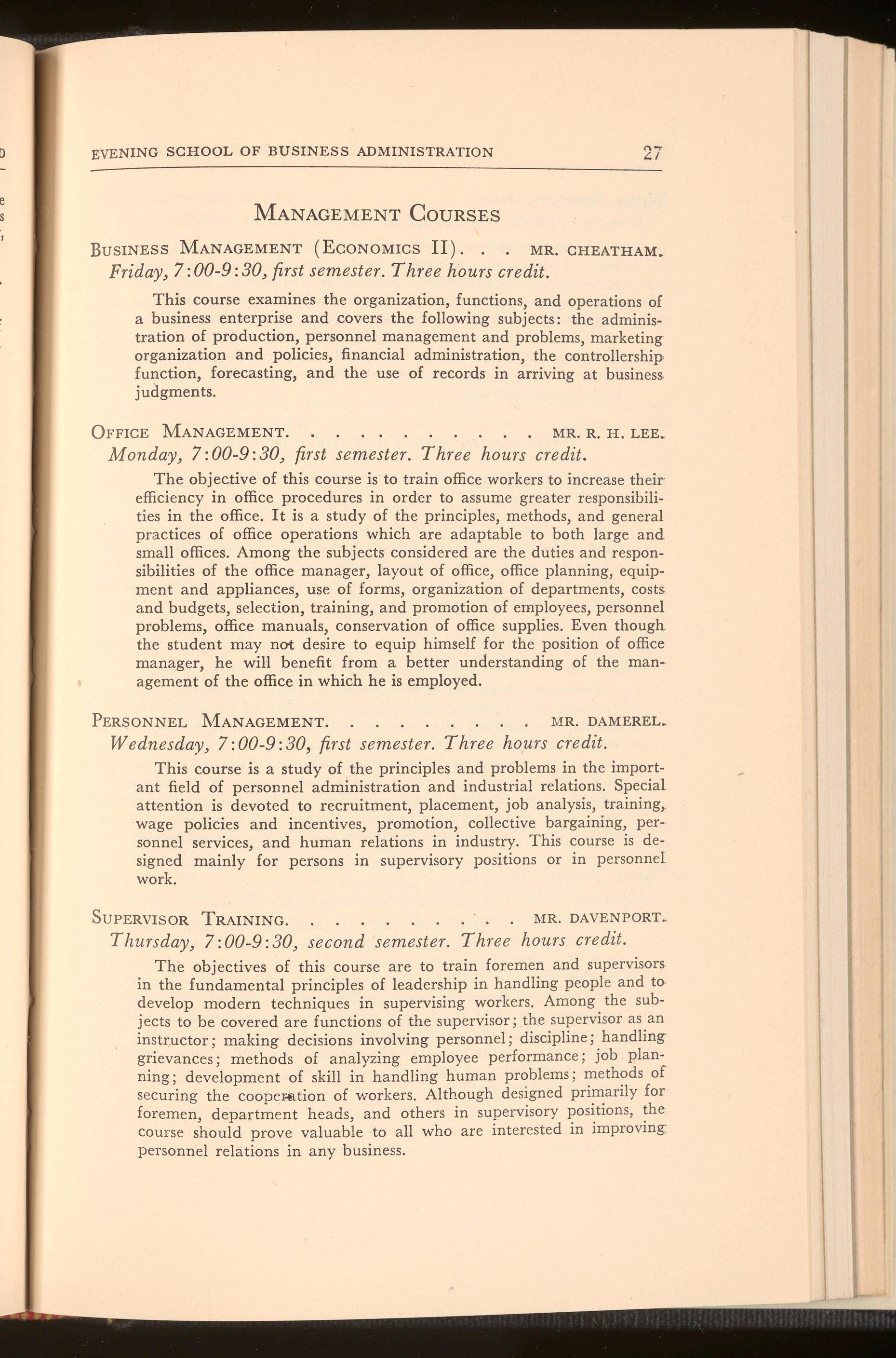
MR. R.H. LEE.
Monday, 7:00-9:30, first semester. Three hours credit.
The objective of this course is to train office workers to increase their efficiency in office procedures in order to assume greater responsibilities in the office. It is a study of the principles, methods, and general practices of office operations which are adaptable to both large and small offices. Among the subjects considered are the duties and responsibilities of the office manager, layout of office, office planning, equipment and appliances, use of forms, organization of departments, costs and budgets, selection, training, and promotion of employees, personnel problems, office manuals, conservation of office supplies. Even though. the student may not desire to equip himself for the position of office manager, he wiH benefit from a better understanding of the management of the office in which he is employed.
PERSONNEL J\1ANAGEMENT.
MR. DAMEREL.
Wednesday, 7: 00-9: 30, first semester. Three hours credit.
This course is a study of the principles and problems in the important field of personnel administration and industrial relations. Special attention is devoted to recruitment, placement, job analysis, training, wage policies and incentives, promotion, collective bargaining, personnel services, and human relations in industry. This course is designed mainly for persons in supervisory positions or in personnel work.
SUPERVISOR TRAINING.
MR. DAVENPORT
Thursday, 7: 00-9: 30, second semester. Three hours credit.
The objectives of this course are to train foremen and supervisors in the fundamental principles of leadership in handling people and to develop modern techniques in supervising workers. Among the subjects to be covered are functions of the supervisor; the supervisor as an instr ,uctor; making decisions involving personnel; discipline; handling grievances; methods of analyzing employee performance; job plan- _ ning; development of skill in handling human problems; methods of securing the coopemtion of workers. Although designed primarily for foremen, department heads, and others in supervisory positions, ~he course should prove valuable to all who are interested in improvmg personnel relations in any business.

WoRK SIMPLIFICATION.
MR. sT. G. T. LEE. Monday, 7:30-9:10, both semesters. Four hours credit.·
This course covers the general phases of industrial engineering. The basis of the course is motion study, including the improvement of methods and the elimination of waste in both factory and office work Also covered are time study, job evaluation, operator training, and standard cost. Motion pictures of typical operations are used, and students wiil make and analyze charts of actual operations. Work simplification methods can be successfully applied in industrial pl a nts, financial institutions, commercial establishments, offices, and other business organizations.
FUNDAMENTALS OF BANKING.
MR. GREEN, Monday, 7:00-9:30, first semester . Three hours credit. ·
This course is a study of the practical, day-to-day operations of a bank, department by department It explains the complex system by which it is possible to receive deposits, make loans, clear checks , a nd perform safely and speedily the many functions of modern banking without excesssive cost.
*MONEY AND BANKING
MR. THOM AS Thursday, 7:00-9:30, second semester. Three hours credit.
This course is a study of the principles of money, banking, and credit, based on historical financial developments in the United Sta tes Among the subjects discussed are the evolution and functions of money, money systems, monetary standards, the relation of mone y to prices, the relationship of monetary policy to business and banking procedures, the various types of banks, development of banking in th e United States, banking functions and operations, the banking system, the Federal Reserve System, commercial banking, investment banking, savings banks, and current monetary and banking developments
*BANK ADMINISTRATION.
MR. WAY NE. Monday, 7:00-9:30, second semester. Three hours credit.
This course is concerned with the problems and policies of b ank management, A review of the responsibility of bank officers is followed by a discussion of personnel policies, budgetary control of bank op erations, audits and examinations, insurance and taxation, business development and advertising policies. The course also deals with the conversion of available funds into earning assets, including methods of controlling diversification, a discussion of loans and discounts, r eal estate loans, and the investment portfolio. It concludes with a summ ary of the cooperation of banks through clearing houses, regional group s, and banking associations.
*CORPORATION FINANCE.
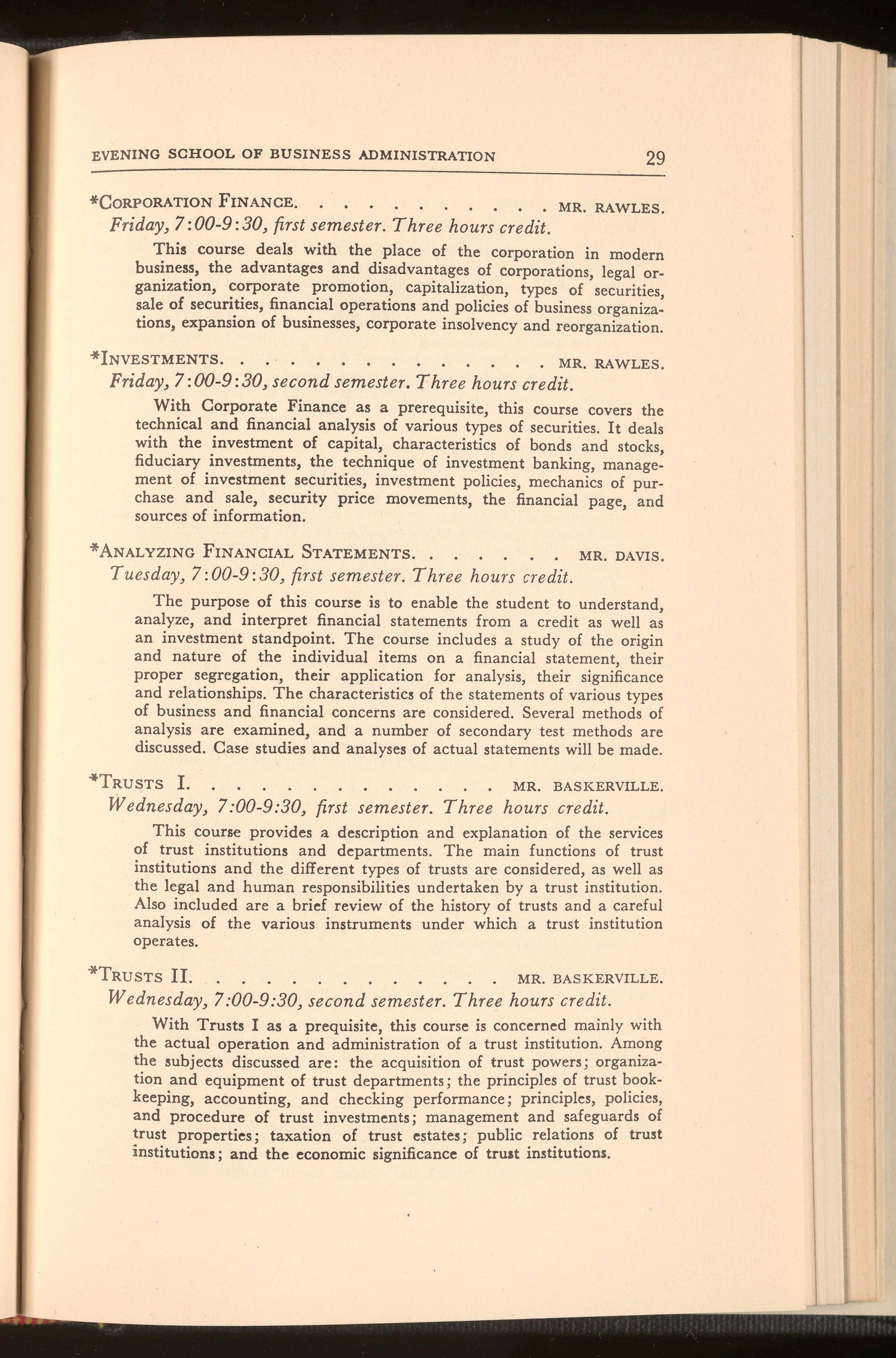
• MR. RAWLES.
Friday, 7: 00-9: 30, first semester. Three hours credit.
This course deals with the place of the corporation in modern business, the advantages and disadvantages of corporations, legal organization, corporate promotion, capitalization, types of securities, sale of securities, financial operations and policies of business organizations, expansion of businesses, corporate insolvency and reorganization.
*INVESTMENTS.
• MR. RAWLES.
Friday, 7: 00-9 :30, second semester. Three hours credit.
With Corporate Finance as a prerequisite, this course covers the technical and financial analysis of various types of securities. It deals with the investment of capital, characteristics of bonds and stocks, fiduciary investments, the technique of investment banking, management of investment securities, investment policies, mechanics of purchase and sale, security price movements, the financial page, and sources of information.
*ANALYZING FINANCIAL STATEMENTS.
Tuesday, 7: 00-9: 30, first semester. Three hours credit.
MR. DAVIS.
The purpose of this course is to enable the student to understand, analyze, and interpret financial statements from a credit as well as an investment standpoint. The course includes a study of the origin and nature of the individual items on a financial statement, their proper segregation, their application for analysis, their significance and relationships. The characteristics of the statements of various types of business and financial concerns are considered. Several methods of analysis are examined, and a number of secondary test methods are discussed. Case studies and analyses of actual statements will be made.
4 TRUSTS J.
MR. BASKERVILLE.
Wednesday, 7 :00-9:30, first semester. Three hours credit.
This course provides a description and explanation of the services of trust institutions and departments. The main functions of trust institutions and the different types of trusts are considered, as well as the legal and human responsibilities undertaken by a trust institution. Also included are a brief review of the history of trusts and a careful analysis of the various instruments under which a trust institution operates.
*TRUSTS IJ.
MR. BASKERVILLE.
Wednesday, 7:00-9:30, second semester. Three hours credit.
With Trusts I as a prequisite, this course is concerned mainly with the actual operation and administration of a trust institution. Among the subjects discussed are: the acquisition of trust powers; organization and equipment of trust departments; the principles of trust bookkeeping, accounting, and checking performance; principles, policies, and procedure of trust investments; management and safeguards of trust properties; taxation of trust estates; public relatio~s of trust institutions; and the economic significance of trust institutions.
UNIVERSITY OF RICHMO ND
MR. BERKEL EY

*CONSUMER CREDIT
Tu esday, 7:00-9 :30, first semester. Three hours credit.
This course deals with the;;various phases of instalment financing and personal loans. It examines the development of consumer lending , th e different types of lending agencies, and the various kinds of consu mer credit. The establishment and operation of a personal Joan departm ent are discussed, and methods of cost control are explained. Also includ ed are methods of conducting the interview, application, and in ve stigation, and the procedures followed in collections and solicitation of new business. Bank policies regarding consumer credit are consid ered Guest lecturers will discuss special problems in various fields of consumer finance.
*CREDIT ADMINISTRATION.
MR. DAVI S. Tuesday, 7: 00-9: 3 0, second sem ester. Thr ee hours cred it
The purpose of this course is to develop an understanding of th e procedures and problems involved in effective credit manag em ent. Consideration is given to various phases of the general cr edit structu re. Among the topics treated are forms of credit, term loans, real est at e loans, sources of credit information, analysis of credit application s, an d a general approach to loan policy.
*HOME MORTGAGE LENDING.
• MR. D U RR ETTE
Thursday, 7: 00-9: 3 0, first sem est er. Thr ee hour s credit
This course involves a study of the principles of home mo r tgage le nding. Special attention is devoted to the evolution of hom e mortgage lending practices. Legal aspects of the mortgage, selecti on of mortgages tog e ther with the nature, sources and m easur ement of risk, organization and operation of a mortgage loan department, us e of curr e nt data as a guide to the administrative control of a mortgag e business and the r egulatory and servicing activities of fed eral and state governments.
BUSIN E SS STATISTICS
Tu esday, 7:00-9:30, first semest er Thr ee hours credit.
MR. FI SHER.
This course is designed to acquaint the business stud e nt with the more common methods of analyzing and interpreting business st a ti stics. Emphasis will be placed upon the practical applications of st a t istical m ethods to business problems. The study will cover prop er us e and interpretation of tables, charts, diagrams, indexes, deviation curves and statistical correlation.
BcsINESS MATHEMATICS.
M R . GR ABLE Tu esday, 7: 00-9 :3 0, second sem ester. Three hours credit.
This course is d esigned to acquaint the business stud ent wit h the m a thematics of business finance. The study will cover annuities, am orti za tion and sinking funds, depreciation, bonds, and the m a th ema tics of life insurance.
EcoNOMICEf IB, PRINCIPLES
MR . MACD ONALD Thursda y , 7:00-8:40, both sem esters. Four hours credit.
This course deals with the fundamental economic principles un derlying the business system and applies sound analysis to current eco-
nomic problems as they affect business conditions. It includes a discussion of the organization of production, the distribution of wealth and income, value and price, and the problems of the consumer. Industries studied are extractive, agricultural, manufacturing, railroads, public utilities, construction, and finance. Among the problems considered are taxation, labor relations, monetary developments, government regulation, international economic relations, business cycles, and recent economic trends.
MR. HILL.
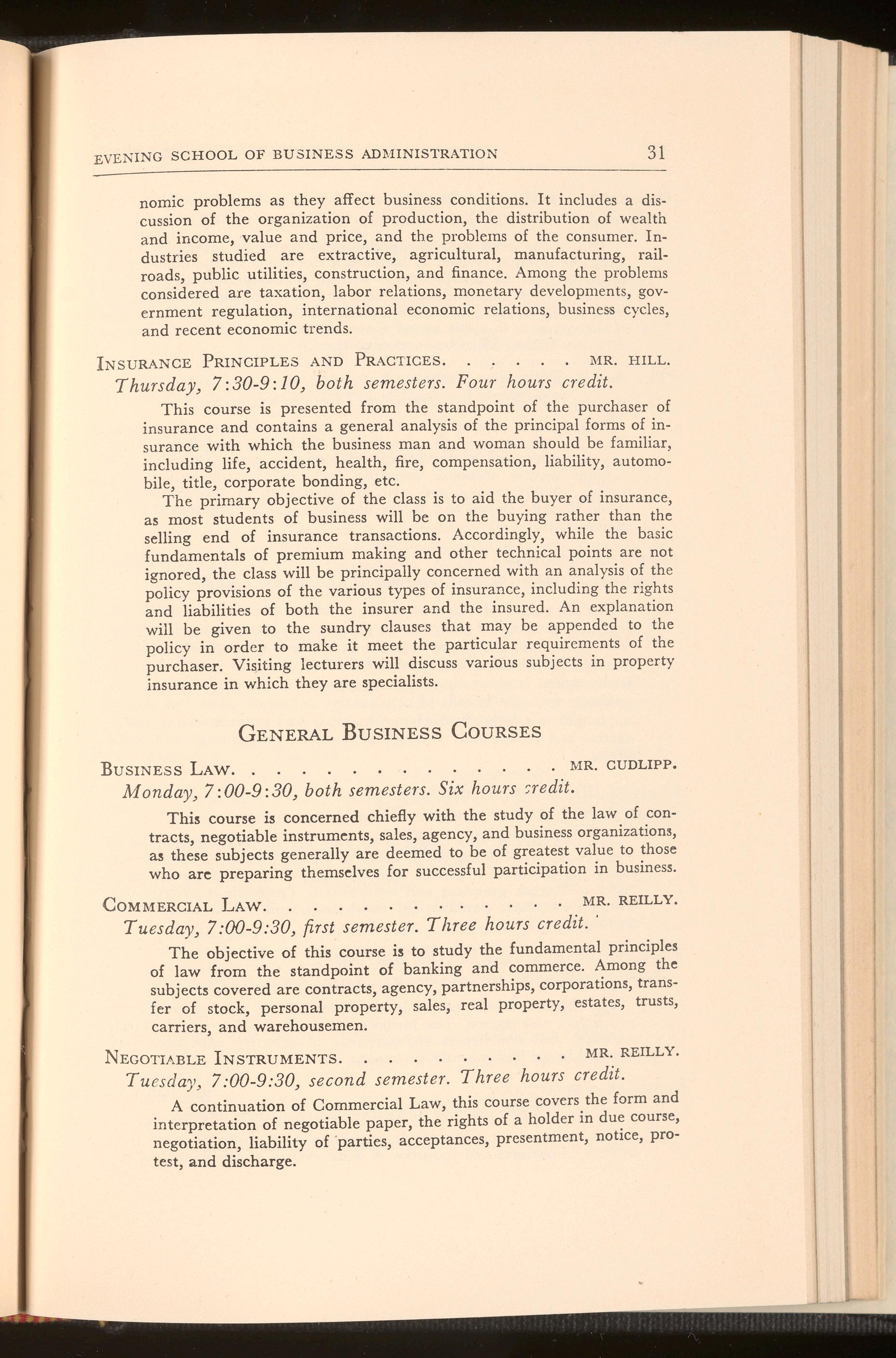
INSURANCE PRINCIPLES AND PRACTICES.
Thursday, 7:30-9:10, both semesters. Four hours credit.
This course is presented from the standpoint of the purchaser of insurance and contains a general analysis of the principal forms of insurance with which the business man and woman should be familiar, including life, accident, health, fire, compensation, liability, automobile, title, corporate bonding, etc.
The primary objective of the class is to aid the buyer of insurance, as most students of business will be on the buying rather than the selling end of insurance transactions. Accordingly, while the basic fundamentals of premium making and other technical points are not ignored, the class will be principally concerned with an analysis of the policy provisions of the various types of insurance, including the rights and liabilities of both the insurer and the insured. An explanation will be given to the sundry clauses that may be appended to the policy in order to make it meet the particular requirements of the purchaser. Visiting lecturers will discuss various subjects in property insurance in which they are specialists.
• MR. CUDLIPP.
BUSINESS LAW.
Monday, 7: 00-9: 30, both semesters. Six hours ,redit.
This course is concerned chiefly with the study of the law of contracts, negotiable instruments, sales, agency, and business organizations, as these subjects generally are deemed to be of greatest value to those who are preparing themselves for successful participation in business.
MR. REILLY.
COMMERCIAL LAW.
Tuesday, 7:00-9:30, first semester. Three hours credit.·
The objective of this course is to study the fundamental principles of law from the standpoint of banking and commerce. Among the subjects covered are contracts, agency, partnerships, corporations, transfer of stock, personal property, sales, real property, estates, trusts, carriers, and warehousemen.
MR. REILLY.
NEGOTIABLE INSTRUMENTS.
T uesda')', 7:00-9 :30, second semester. Three hours credit.
A continuation of Commercial Law, this course covers the form and interpretation of negotiable paper, the rights of a holder in du~ course, negotiation, liability of parties, acceptances, presentment, notice, protest, and discharge.
UNIVERSITY OF RICHMOND
PRINCIPLES OF ECONOMICS J (a) MR. BROCK.
Tuesday, 7: 00-9: 30, both semesters. Six hours credit.
This course deals with the fundamental economic principles underlying the business system. It includes a discussion of the organization of production, the distribution of wealth, consumption, value and exchange, money and banking, foreign and domestic trade, labor problems, public finance, and social control of business. The main purpose of the course is to apply sound economic analysis to current economic problems as they affect business conditions.
*HISTORY OF ECONOMIC THOUGHT. . MR. THOMAS.
Thursday, 7: 00-9 :30, first semester.Three hours credit.
This seminar course is a study of the development of economic ideas. I ts purpose is to give the student the background that is necessary to understand contemporary economic thought. The plan is to examine certain economic concepts, including wealth, value, price, profits, interest, wages, and rent, in relation to the environment in which they developed and to the doctrines that are significant at the present time.
EFFECTIVE SPEAKING.
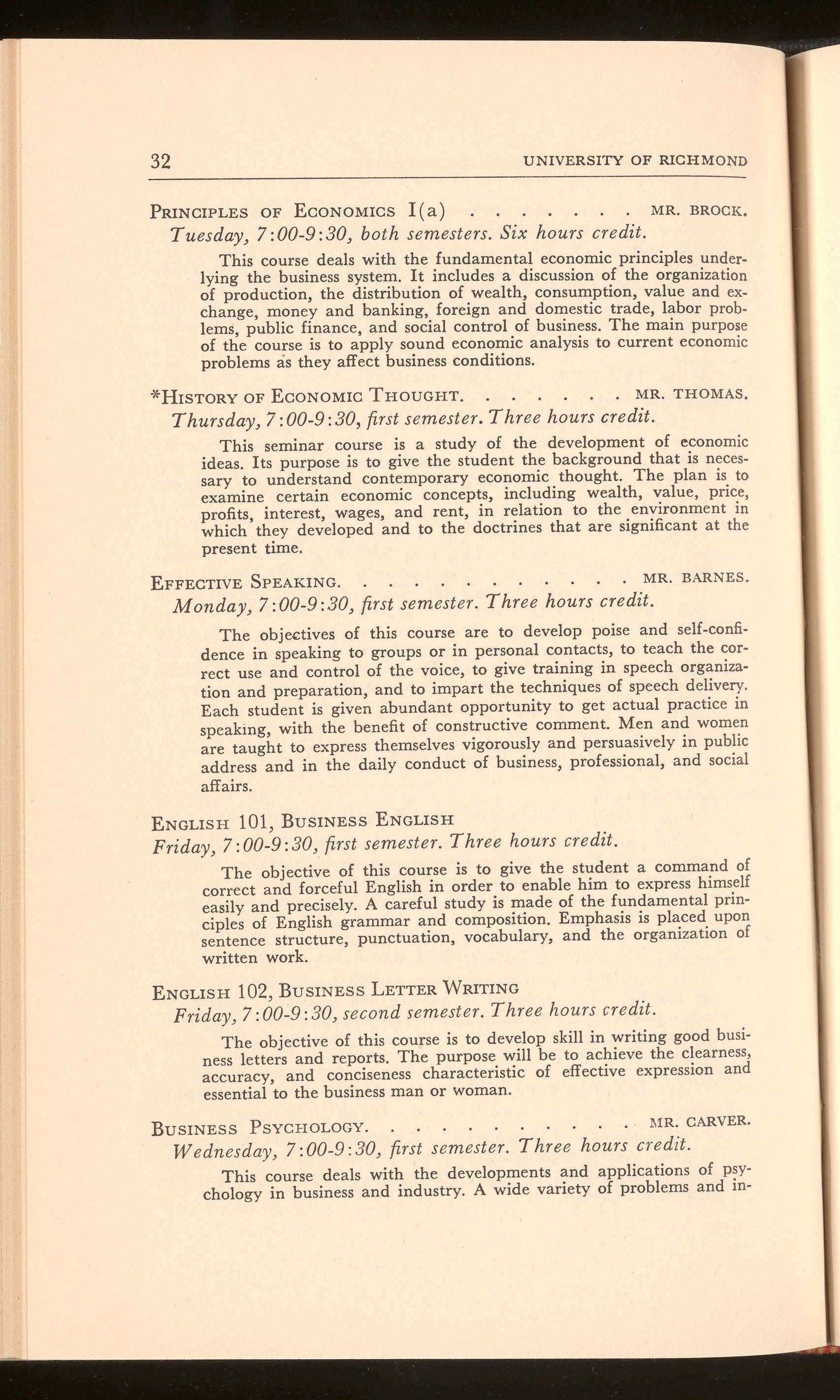
MR. BARNES
Monday, 7:00-9:30, first semester. Three hours credit.
The objectives of this course are to develop poise and self-confidence in speaking to groups or in personal contacts, to teach the correct use and control of the voice, to give training in speech organization and preparation, and to impart the techniques of speech delivery. Each student is given abundant opportunity to get actual practice in speaking, with the benefit of constructive comment. Men and women are taught to express themselves vigorously and persuasively in public address and in the daily conduct of business, professional, and social affairs.
ENGLISH 101, BUSINESS ENGLISH
Friday, 7: 00-9: 30, first semester. Three hours credit.
The objective of this course is to give the student a command of correct and forceful English in order to enable him to express himself easily and precisely. A careful study is made of the fundamental principles of English grammar and composition. Emphasis is placed upon sentence structure, punctuation, vocabulary, and the organization of written work.
ENGLISH 102, BUSINESS LETTER WRITING
Friday, 7: 00-9: 30, second semester. Three hours credit.
The objective of this course is to develop skill in writing good business letters and reports. The purpose will be to achieve the clearness, accuracy, and conciseness characteristic of effective expression and essential to the business man or woman.
BUSINESS PSYCHOLOGY.
MR. CARVER. W ednesda,y, 7: 00-9: 30, first semester. Three hours credit.
This course deals with the developments and applications of psychology in business and industry. A wide variety of problems and in-
vestigations relating to individual differences, employee selection and placement, training methods, safety, work, fatigue, efficiency, market research, etc., are considered with special emphasis upon the sound practical contributions of psychology to business.
PERSONNEL PSYCHOLOGY.
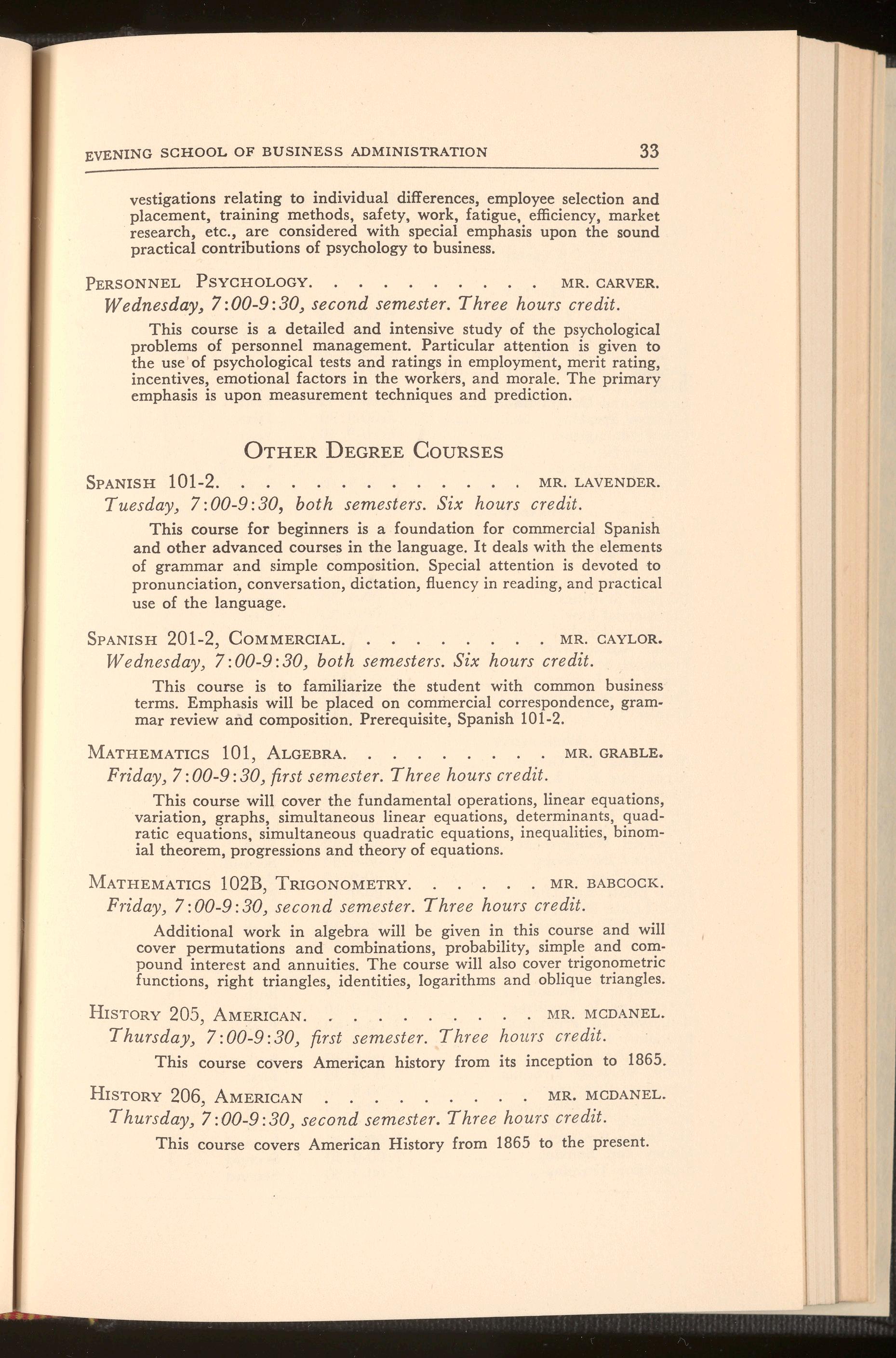
MR. CARVER.
Wednesday, 7:00-9:30, second semester. Three hours credit.
This course is a detailed and intensive study of the psychological problems of personnel management. Particular attention is given to the use of psychological tests and ratings in employment, merit rating, incentives, emotional factors in the workers, and morale. The primary emphasis is upon measurement techniques and prediction.
SPANISH 101-2.
MR. LAVENDER.
Tuesday, 7: 00-9: 30, both semesters. Six hours credit.
This course for beginners is a foundation for commercial Spanish and other advanced courses in the language. It deals with the elements of grammar and simple composition. Special attention is devoted to pronunciation, conversation, dictation, fluency in reading, and practical use of the language.
SPANISH 201-2, COMMERCIAL.
MR CAYLOR.
Wednesday, 7: 00-9: 30, both semesters. Six hours credit.
This course is to familiarize the student with common business terms. Emphasis will be placed on commercial correspondence, grammar review and composition. Prerequisite, Spanish 101-2.
MATHEMATICS 101, ALGEBRA.
MR. GRABLE. Friday, 7:00-9:30, first semester. Three hours credit.
This course will cover the fundamental operations, linear equations, variation, graphs, simultaneous linear equations, determinants, quadratic equations, simultaneous quadratic equations, inequalities, binomial theorem, progressions and theory of equations.
MATHEMATICS 102B, TRIGONOMETRY. . MR. BABCOCK. Friday, 7:00-9:30, second semester. Three hours credit.
Additional work in algebra will be given in this course and will cover permutations and combinations, probability, simple and compound interest and annuities. The course will also cover trigonometric functions, right triangles, identities, logarithms and oblique triangles.
HISTORY 205, AMERICAN.
MR. MCDANEL. Thursday, 7:00-9:30, first semester. Three hours credit.
This course covers American history from its inception to 1865.
HISTORY 206 AMERICAN
MR. MCDANEL. Thursday, 7:00-9:30, second semester. Three hours credit.
This course covers American History from 1865 to the present.
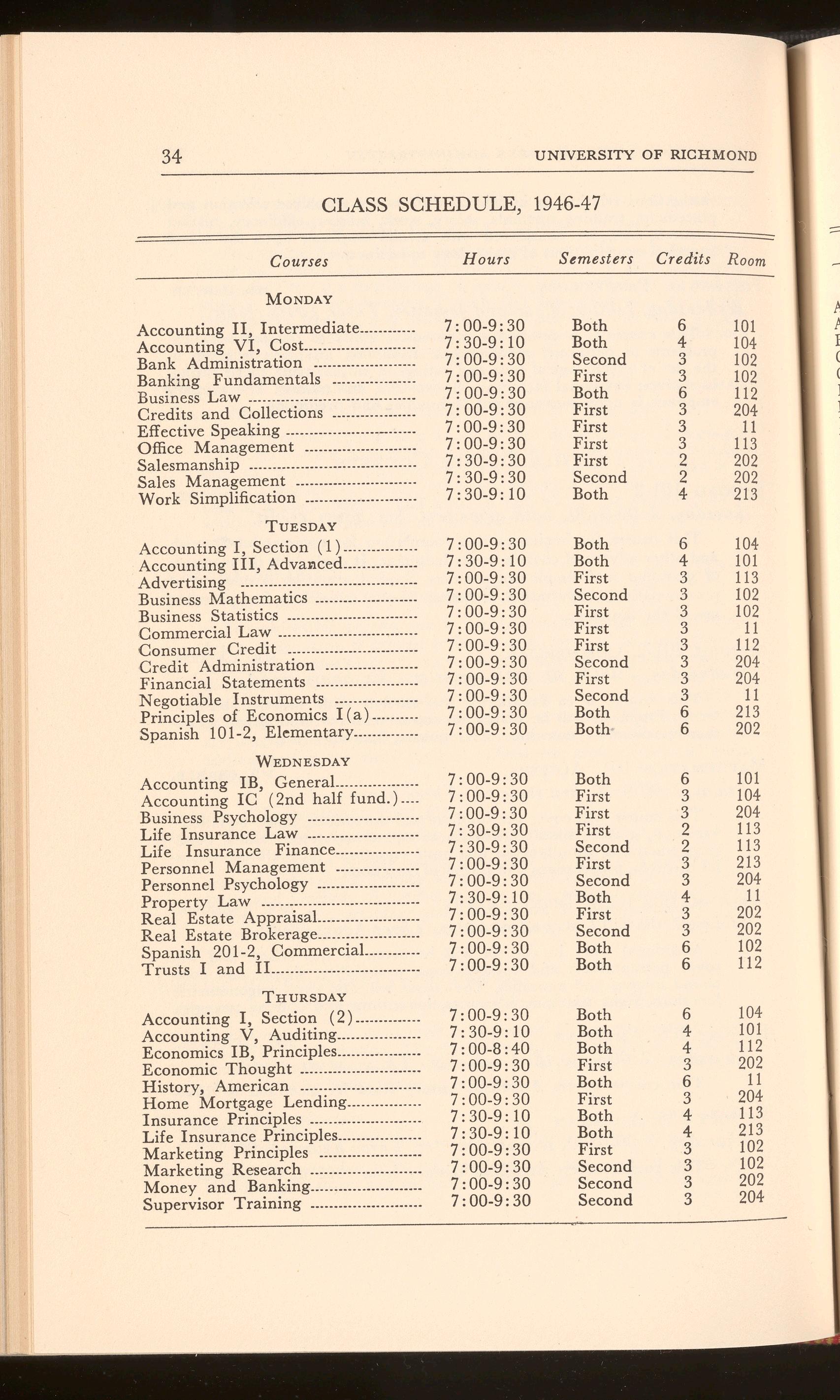
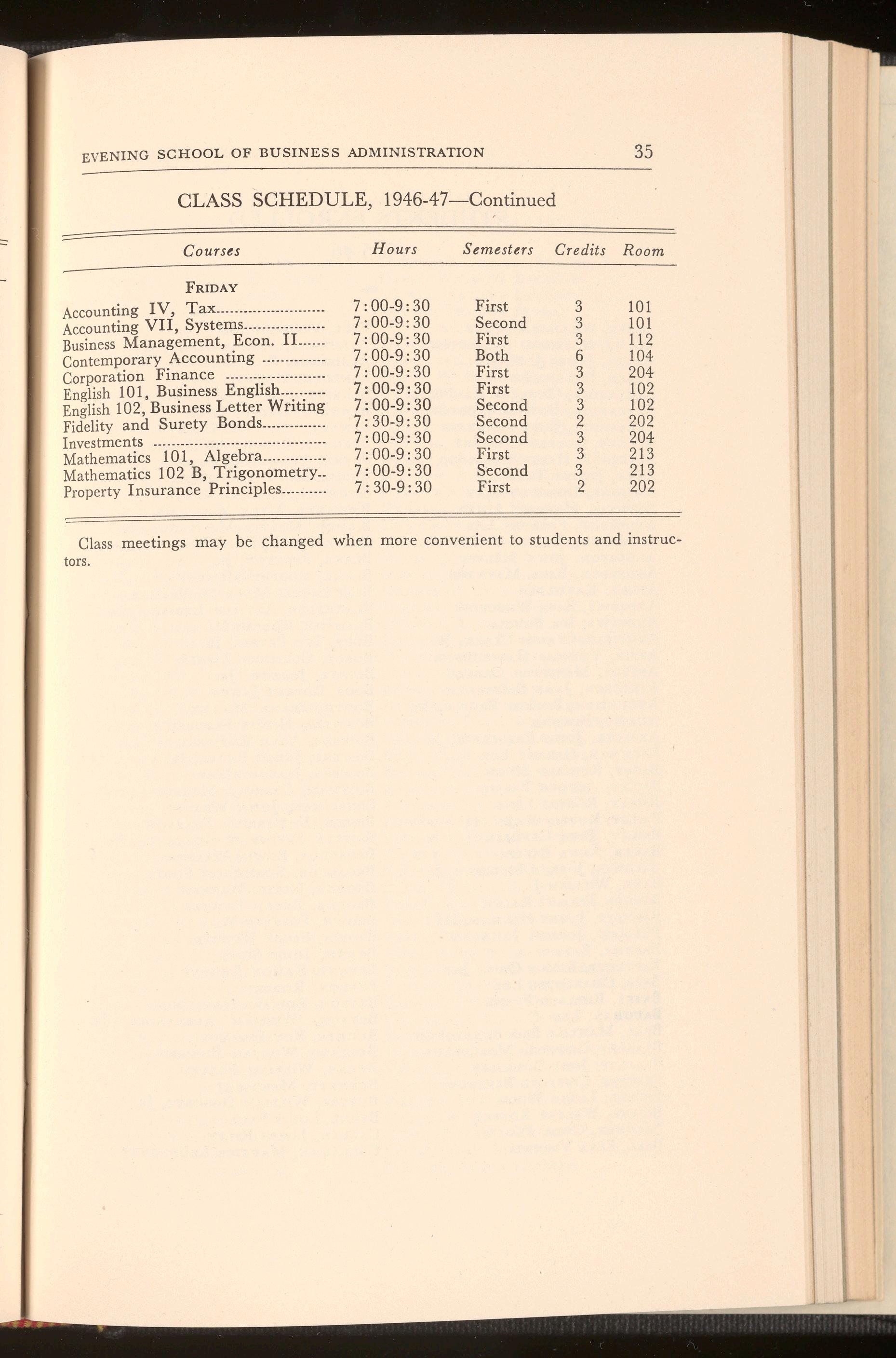
Class meetings may be changed when more convenient to students and instructors.
UNIVERSITY OF RICHMOND
ACREE, WILLIAM LUTHER
ADAMS, RAYMOND ARLINGTON
AKERS, JAMES J. s., III
ALLEN, HELENA LOUISE
ALEXANDER, CHARLES RANDOLPH
ALEXANDER, DONALD MORTON
ALEXANDER, JOHN FRANKLIN
ALLNUT, ROBERT CARHART
ALVERSON, HARRY LYNWOOD, JR.
AMES, JULIUS TAYLOR
AMMONS, DOROTHY MAY
AMMONS, MAURICE ALLEN
ANDERSON, FRANCES LEE
ANDERSON, GEORGE CLAIBORNE
ANDERSON, JOHN MELVIN
ANDERSON, PAUL MAYNARD
ANDRE, KATHLEEN
ANDREWS, EARL WOODROW
ANDREWS, IDA BRUCIA
ARMFIELD, CLAUDE CLARK, JR.
ARVIN, THOMAS HAWTHORNE
ASTLEY, MEREDITH CABELL
ATKINSON, JANE ELIZABETH
AUGUSTINE, ROBERT BROWN, JR.
AUSTIN, ROLAND
AxsELLE, JOHN FREDERICK, JR.
BACHMAN, GARNET LEE
BAGBY, RICHARD HUGH
BAILEY, ARCHER FARISS
BAILEY,' ROBERT OTIS
BAILEY, RUFFIN RHEN
BAILEY, TYRA CLIGMAN
BAKER, ANNA BELLE
BALDWIN, JOSEPH SILLIMAN, JR.
BANK, WILLIAM J.
BARKER, EUGENE RALPH
BARNETT, JAMES HARMON, III
BAROODY, JOSEPH JOHNSON
BARTHA, ERNEST
BARTLETT, BRYAN ORIN, JR.
BASS, CHARLOTTE LEE
BATES, RICHARD FRANK
BAUGHAN, LEE
BEAL, MAHLON BROCKENBROUGH
BEASLEY, CLIFFORD MARCELLUS
BEAZLEY, JOHN BOUGHAN
BEAVERS, CLIFFORD BEVERLY
BEDELL, Lours Woon
BEIRNE, WALTER ROBERT
BELCHER, CECIL FLOYD
B!':LL, ELVA VIRGINIA

BELL, VIRGINIA LEE
BENDHEIM, ADRIAN LEROY, JR.
BENDHEIM, RICHARD
BENEDEK, HENRY
BENEFIELD, JOSEPH TURBERVILLE
BENNETT, CALVIN LYLE
BENNETT, EDWARD LADD
BERNARD, ELIZABETH HERNDON
BEYKE, AUGUSTINE GEORGE, JR.
BICKELHAUPT, GRETCHEN
BIRCHETT, HORACE GARY
BIRCHETT, MARY WILLIAMS
BISHOP, MELVIN MONTAGUE, JR. BLACKWELL, JOHN DAVENPORT
BLAKE, PRESTON, JR. BLAKE, ROBERT MURRAY BLAKEMORE, MAURICE NEVILLE BLAKESLEE, ARTHUR LEOPOLD, JR. BLANTON, ROBERT D. BLUE, IVY PETRIE, JR. BoELT, CLEMENS EWALT
BONITZ, JOSEPH, JR. Boos, RoBERT JAMES BOOTH, FRANK MILLET BOSWELL, HENRY FREDERICK BOWERS, ADAM ROSWELL
BOWERS, JAMES BAKER, JR. BOWERS, JEANNE CARYL BOWMAN, CARROLL MORRIS BRIDGEMAN, JOHN WRIGHT BRIGGS, KATHERINE PEARSON BRITTLE, FREDERICK GUSTAVUS, JR. BROADDUS, EDWIN WARNER BROADDUS, SINGLETON SCOTT BROOKS, CLYDE WARREN BROOKS, ELLEN POWELL BROWN, FORREST W. BROWN, PEGGY HUNTER BRUSH, JOHN SIVEY BRYANT, RAMON EUGENE BRYDON, ROBERT BRYSON, EDWARD HAMILTON BRYSON, WILLIAM ALEXANDER, JR. BUCHER, ROY EDWARD BULLARD, WILLIAM EDWARD BURKE, WILLIAM FRALEY BURNETT, MARGARET BUTLER, WILLIAM DOGGETT, JR. BYRNE, Lours PAUL CALLAN, JAMES RILEY CALLAHAN, MA11RICE LEBOSQUET
Students Enrolled in the Evening School of Business Administration, 1945-46
CAMPBELL, CHARLES ALFRED, JR.
CAMPBELL, ROBERT KENNETH
CAMPBELL, RoY MONROE
CANDLER, ANNE ELIZABETH
CARTER, MERCEDES MORGAN
CASH, LAWRENCE MOLES
CASHELL, MARGARET THUERER
CATALANO, TERESA VERDIER
CAUTHORNE, ROBERT G.
CHALKLEY, CLINTON RUSSELL
CHALKLEY, H. OTWAY
CHAMBERS, WILLIAM A.
CHANDLER, JOHN WILLIAM
CHARLES, JACQUELINE VIRGINIA
CHEATHAM, ROBERT BENJAMIN
CHERRY, RUSSELL THOMAS, ]R. CHEWNING, WILLIAM CARROLi
CHILDRESS, STUART PRESTON
CHILDREY, LISTON WAYNE
CLARK, ARTHUR LEROY
CLARK, CHARLES WILSON
CLARK, JAMES
CLARK, ]AMES DANIEL, ]R.
CLARK, Louis MAsoN
CLARK, SAMUEL SMITH
CLARKE, WILLIAM THOMAS
COKER, CHARLES LIGGETT
COLEMAN, EDWARD BEAUCLERK COLLINS, MARGARET FRANCES
COMBS, NORMA LEE
CONNELLY, MABEL ]ONES
CooK, WILLIAM EDWARD COPELAND, MAUDE CHEATHAM. COPPLE, ERNEST HAFFORD CORNWELL, BREWSTER THORNTON CORRY, CLINTON BYRD CoRso, Louis JAMES COSBY, DORA PERKINS
COUPER, AUGUSTA BEALE COUTTS, WELFORD LYON COWLING, ELIZABETH Cox, ]AMES BERNARD, JR. Cox, JAMES KIMBROUGH
CROCKETT, WINIFRED EILEEN CROUCH, JOHN CAMPBELL CROWDER, CLIFFORD HARMON CRUMP, BERNARD WINSTON, ]R. CRUMP, LEWIS THOMAS CUNNINGHAM, WILLIAM CLEMENT
CURLEY, ANN KATHARINE CURRY, LUCIAN RALSTON
DABNEY, ANNETTE DAVIS
DAILY, MARGARET L.
DANIEL, WILLIAM LEWIS
DANIELS, ]AMES WALTER, ]R.
DAVID, ]OHN EDWARD, JR.
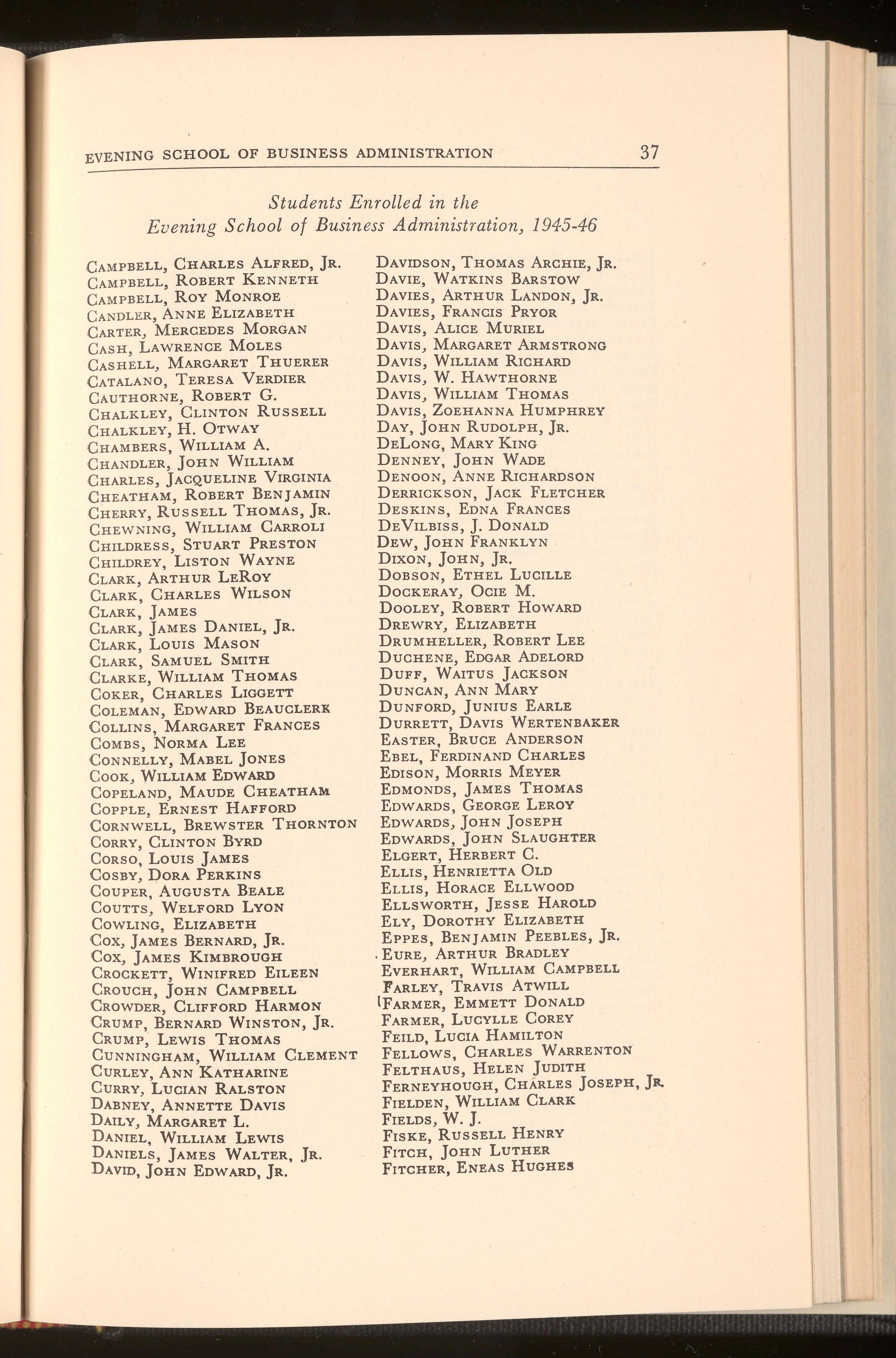
DAVIDSON, THOMAS ARCHIE, JR.
DAVIE, WATKINS BARSTOW
DAVIES, ARTHUR LANDON, JR.
DAVIES, FRANCIS PRYOR
DAVIS, ALICE MURIEL
DAVIS, MARGARET ARMSTRONG
DAVIS, WILLIAM RICHARD
DAVIS, W. HAWTHORNE
DAVIS, WILLIAM THOMAS
DAVIS, ZOEHANNA HUMPHREY
DAY, ]OHN RUDOLPH, JR.
DELONG, MARY KING
DENNEY, JOHN WADE
DENOON, ANNE RICHARDSON
DERRICKSON, ]ACK FLETCHER
DESKINS, EDNA FRANCES
DEVILBISS, J. DONALD
DEW, JOHN FRANKLYN
DIXON, JOHN, JR.
DOBSON, ETHEL LUCILLE
DOCKERAY, OCIE M.
DOOLEY, ROBERT HOWARD
DREWRY, ELIZABETH
DRUMHELLER, ROBERT LEE
DUCHENE, EDGAR ADELORD
DUFF, WAITUS JACKSON
DUNCAN, ANN MARY
DUNFORD, JUNIUS EARLE
DURRETT, DAVIS WERTENBAKER
EASTER, BRUCE ANDERSON
EBEL, FERDINAND CHARLES
EDISON, MORRIS MEYER
EDMONDS, JAMES THOMAS
EDWARDS, GEORGE LEROY
EDWARDS, JOHN JosEPH
EDWARDS, JOHN SLAUGHTER
ELGERT, HERBERT C.
ELLIS, HENRIETTA OLD
ELLIS, HORACE ELLWOOD
ELLSWORTH, JESSE HAROLD
ELY, DOROTHY ELIZABETH
EPPES, BENJAMIN PEEBLES, JR. , EURE, ARTHUR BRADLEY
EVERHART, WILLIAM CAMPBELL
FARLEY, TRAVIS ATWILL
(FARMER, EMMETT DONALD
FARMER, LucYLLE CoREY
FEILD, LUCIA HAMILTON
FELLOWS, CHARLES WARRENTON
FELTHAUS, HELEN JUDITH
FERNEYHOUGH, CHARLES JOSEPH, ]R..
FIELDEN. WILLIAM CLARK
FIELDS, W. J.
FISKE, RUSSELL HENRY
FITCH, JOHN LUTHER
FITCHER, ENEAS HUGHES
UNIVERSITY OF RICHMOND
Students Enrolled in the Evening School of Business Administration, 1945-46
FITZHUGH, MARGARET W.
FLEISCHER, ALAN GEORGE
FLETCHER, THOMAS CussoNs, JR.
FLIPPIN. ANNE HILL
FLOYD, MARION EDWARD, JR.
FOISTER, EDITH FITZALLEN
FOLEY, EDWARD HOEL
FOLEY, THOMAS P.
FORD, ETHEL ELIZABETH
FORD, H. ERNEST
FoRD, RYLAND HOLMAN
FORD, VERNON WELFORD
FoRSTMANN, BERNARD LINWOOD
FOSTER, THOMAS FLEMMING
Fox, JAMES JOSEPH
FOWLKES, DORIS GREY
FRANCIS, ANDREW JOSEPH
FRANCIS, JAMES T.
FREEMAN, THEODORE S.
FRY, JOHN G., JR.
FUNKHOUSER, GRACE LOUIS!!.
GADBERRY, EDWIN, JR.
GALLAGHER, MARTIN 0.
GARNETT, JAMES MILTON, JR.
GARY, ERNEST DuToY
GARY, FRED MAXEY
GARRETT, KARL FREDERICK
GARRISON, KATHLEEN ANN
GAY, WALTER RALPH
GILES, DOUGLAS HUMPHREY
GILES, GEORGE ALEXANDER
GILL, HARVEY s., JR.
GILLETTE. WALTER BOOTH
GILLIAM, WILLIAM LEE, JR. CiTNSBERG, BERNHARD
GODFREY, COULBOURN HORNE
GODFREY, THOMAS BEVERLY
GOODMAN, LUCILLE HALL
GOODWYN, WILLIAM HUGH
GoULDIN, LUCILLE
GRAHAM, EUGENE MATHEWS
GRAHAM, PATRICIA BOOTHE
GRAHAM, ROBERT PIERCE
GREEN, CHARLES CARL
GREEN, CLIFTON YOUNG
GRIFFIN, JOSEPH HOWERTON
GRIFFITHS, JANE DixoN
GRIGG, JOHN EDWARD
(;RIGG, JACQUELINE SAMUELS
GROSSMAN, LEON
GROW, JAMES WILLIAM
GRUBBS, GEORGE RONALD
GRUBBS, HARVEY EVERIDGE
GUISE, NOEL CLARENCE
GUNN, VIRGINIA ELLIS

GWATKIN, JAMES DEGOOLARD
GWYNN, JULIUS DONALDSON
HADDER, WADE HAMILTON
HADDON, WOODROW ASHLEY
HADEN, WALTER ROBERT
HAINES, GORDON COOPER
HAIR, B. LUCINDA
HALL, JESSE BERNARD
HALL, SAMUEL ERVIN
HAMILTON, EDWARD SPR UX T
HANKINS, HILDA
HANKINS, JACK FRANKLI N
HANNER, ROBERT NE I L, JR.
HANSON, BENJAM IN GRAY
HANSON, WILLIAM PALMER
HARLESS, DORIS ETHEL
HARPER, JAMES FRANKLIN
HARRIS, CLYDE EARL
HARRIS, l\{ARGARET GRAY
HARRIS, ROBERT LOGAN, JR
HARRIS, ROBERT MARVIN CL IF TO X, J R
HARRIS , WILLIAM L.
HARRISON, JOSEPH FLEET
HART, FRANK, B., JR 1-IARTANOV, ANDREW S. HARTLESS, HARRIETTE ANNE
HASHER, BETTY STUART
HATCH, ARLINE MITCHELL
HAY, THOMAS EDWARD, JR.
HAYES, MASON RUSSELL
HAYNES, MARIAN FRANKLIN
HAZELWOOD, ELSIE VALENTINE
HEDGPETH, RICHARD THOMAS
HEDRICK, VERLAND JOHNSTON
HENDERSON, MARGUERITE B.
HERMANN, WILLIAM FRANK
HERNDON, BRODIE STRACHAR
HERRING, LUCILLE ELIZABETH
HETZER, RoY AUGUST
HEY, CHARLES ELBURG, JR.
HICKS, WILLIAM B , JR.
HINNANT, WILLIAM MACON
HOEN, H,JDSO N PHILI P , JR. HOFHEIMER, NORMA ]ANET
HOGE, JOYCE VIRGINIA
HOLLAND, ]AMES EDWARD
HOLMES, PRESTON TURNER
HOOKER, WALTER
HOSKINS, STUART WALKER
HOTT, GEORGE ELWOOD
HOUGH, SHIRLEY ANGUS
HUBBARD, JAMES EDWARD
HUBBARD, 'WILLIAM HANES
HUFF, THEODORE GEO. R.
HUFFMAN, FLEMING DINGUS
Students Enrolled in the Evening School of Business Administration, 1945-46
HUGHES, WILLIAM JOHN HULCHER, BERNARD MATTHEW
HULL, CHARLES MANN
HUMBER, HERMAN w.
HYDE, FRANK TAYLOR
HYDE, LEWIS HUNTINGTON
HYDE, MARY SEWALL
IMOBERSTEG, HARLAN DALE, JR
INGRAM, HERMAN L.
ISAACS, CHARLES ALLEN, JR. JACOBS, ALEXANDER SAMUEL JACOBSEN, OLIVER SINCLAIR
JAMES, SPRUEL PENDLETON, JR.
JAMESON, ARCHER LEROY
JEFFERSON, LLOYD ULRICH
JENKINS, W. LAWRENCE JENNINGS, HAMLET GREY JENNINGS, PERCY WRAY
JOEL, BETTIE
JOHNSON, ANN WINGFIELD
JOHNSTON, COLEMAN, JR.
JOHNSTON, JOSEPH MAURY, JR.
JONES, ARTHUR EDWARD
JONES, EUGENE RAWLINGS
JONES, FRANCES ELIZABETH
JONES, MEADE ADDISON
JONES, RALPH GORDON
JONES, RICHARD JAMES
JONES, ROBERT TAFT
JOSLYN, OTIS EDWARD
KACENA, CHARLES MARTIN
KAIN, MARGARET ANN
KANE, ROBERT JOHN
KELLER, AUGUST PAUL
KELLEY, THEO. W.
KENNEDY, DAVID CURRIE, JR. KENT, CHARLES WILLIAMSON
KENT, JULIA GORDON
KESSLER, JOHN W.
KESSLER, RICHARD CALVIN
KING, CHARLES NEWTON, JR. KING, GRACE ELIZABETH
KIRBY, VIRGINIA RUTH
KITTENPLAN, EVELYN RosE
KLEIN, EDWARD MILTON
KNIGHT, DORIS GWYNNE
KNIGHT, MARIE E.
KREY, JOHN HENRY
KUPER, ELIZABETH B.
LAIRD, DOUGLAS W.
LAIRD, ELIZABETH LLOYD
LANE, HARVEY RAYMOND
LANEAVE, FRANCES MILLER
LAW, VIRGINIA ELIZABETH
LAWSON, DIXIE CASSIDY
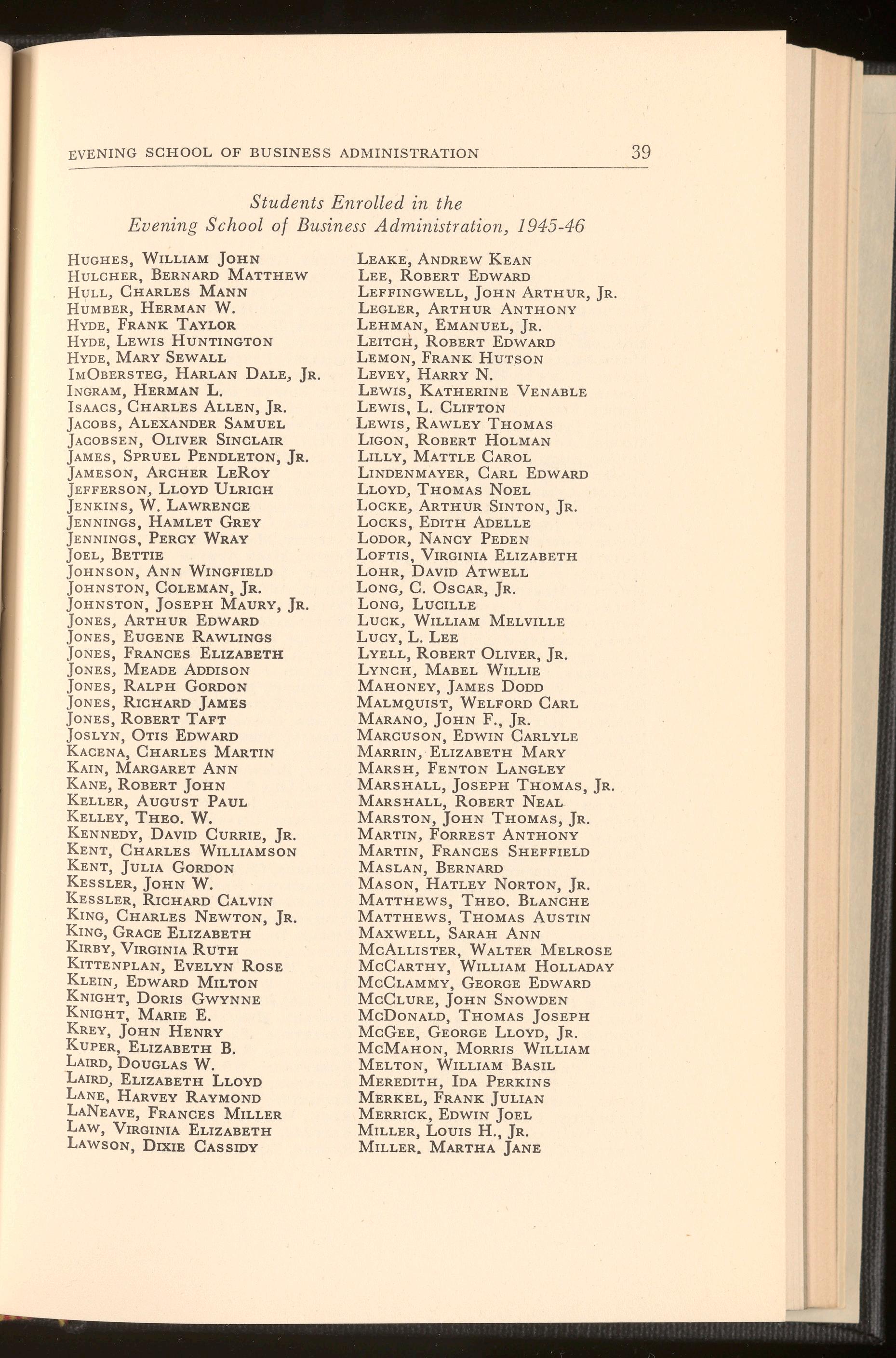
LEAKE,ANDREWKEAN
LEE, ROBERT EDWARD
LEFFINGWELL, JOHN ARTHUR, JR.
LEGLER, ARTHUR ANTHONY
LEHMAN, EMANUEL, JR.
LEITCH, ROBERT EDWARD
LEMON, FRANK HUTSON
LEVEY, HARRY N.
LEWIS, KATHERINE VENABLE
LEWIS, L. CLIFTON
LEWIS, RAWLEY THOMAS
LIGON, ROBERT HOLMAN
LILLY, MATTLE CAROL
LINDENMAYER, CARL EDWARD
LLOYD, THOMAS NOEL
LOCKE, ARTHUR SINTON, JR.
LOCKS, EDITH ADELLE
LonoR, NANCY PEDEN
LOFTIS, VIRGINIA ELIZABETH
LOHR, DAVID ATWELL
LONG, C. OSCAR, JR.
LONG, LUCILLE
LUCK, WILLIAM MELVILLE
LUCY, L. LEE
LYELL, ROBERT OLIVER, JR.
LYNCH, MABEL WILLIE
MAHONEY, JAMES Dono
MALMQUIST, WELFORD CARL
MARANO, JOHN F., JR.
MARCUSON, EDWIN CARLYLE
MARRIN, ELIZABETH MARY
MARSH, FENTON LANGLEY
MARSHALL, JOSEPH THOMAS, JR.
MARSHALL, ROBERT NEAL
MARSTON, JOHN THOMAS, JR
MARTIN, FORREST ANTHONY
MARTIN, FRANCES SHEFFIELD
MASLAN, BERNARD
MASON, HATLEY NORTON, JR.
MATTHEWS, THEO, BLANCHE
MATTHEWS, THOMAS AUSTIN
MAXWELL, SARAH ANN
McALLISTER, WALTER MELROSE
McCARTHY, WILLIAM HoLLADAY
MCCLAMMY, GEORGE EDWARD
McCLURE, JOHN SNOWDEN
McDONALD, THOMAS JOSEPH
McGEE, GEORGE LLOYD, JR.
McMAHON, MoRRis WILLIAM
MELTON, WILLIAM BASIL
MEREDITH, IDA PERKINS
MERKEL, FRANK JULIAN
MERRICK, EDWIN JOEL
MILLER, Louis H., JR.
MILLER. MARTHA JANE
UNIVERSITY OF RICHMOND
Students Enrolled in the Evening School of Business Administration, 1945-46
MILLER, Ross FERGUSON
MINOR, CARLTON WHITFIELD
MINTER, DOROTHY LUCILLE
MITCHELL, KATHARINE
MODLIN, JOHN REID
MONCURE, RICHARD CASSIUS LEE
MONTGOMERY, JAMES HENRY, JR.
MOORE, CAMILLE HARTLESS
MOORE, EARL DOUGLAS
MOORE, ELIZABETH CARTER
MOORE, JACQUELINE MARIAN
MOORE, LEO PATRICK
MooRE, Lucy MAY
MooRE, SALLIE CAMPBELL
MORAN, ROBERT HENSON
MOSELEY, HARRY DANIEL
MOSELEY, JOHN CARTER
MOSER, ROBERT BEAVER
MOTTLEY, JEFFERSON DAVIS, JR.
MOUNTCASTLE, LAWRENCE WINFREE
MURPHY, MERTON LESTER
MYERS, FRANK CORNELIUS, JR.
NACHMAN, HENRY DUDLEY
NAVAS, STANLEY RALPH
NEBLETT, C. G.
NEWBERRY, ALMA EUGENE
NICHOLS, WILLIAM LATHAM
NICHOLSON, THOMAS OWEN
NIERMAN, HARVEY ADOLPH
NOLAN, MARY C.
NOONAN, RAYMONDE.
NUCKOLS, LAUGHTON WATKINS
NUNNALLY, MAURICE ARTHUR
OPPENHEIMER, ALBERT BRUNO
OPPENHIMER, ST. JULAIN, JR.
ORGAIN, JOHN BARBOUR, JR.
OSLIN, CHARLES ONEST
OTTESEN, ALBERT MARVIN
OTTO, JOHN THEIS, JR. OVERTON, RICHARD HARRISON
OWEN, MILDRED ALEASE PANATTONI, IRIS VIRGINIA
PAMPLIN, CLAUDE ALLEN
PAPE, EULA GLASSCOCK
PAPPAS, EVANGEL THOMAS
PARKER, HUBERT THORNTON PARKS, WOODROW LEON
PARRISH, WILBERT CHESTER
PARSONS, LAWRENCE
PAVEY, THELMA LOUVIRIA
PEATROSS, POLLY ZELMA
PEISEL, MARGARET ELIZABETH
PENDLETON, GORDON DOUGLAS
PENN, WILLIAM F., JR.
PERKINS, CLARENCE WARREN
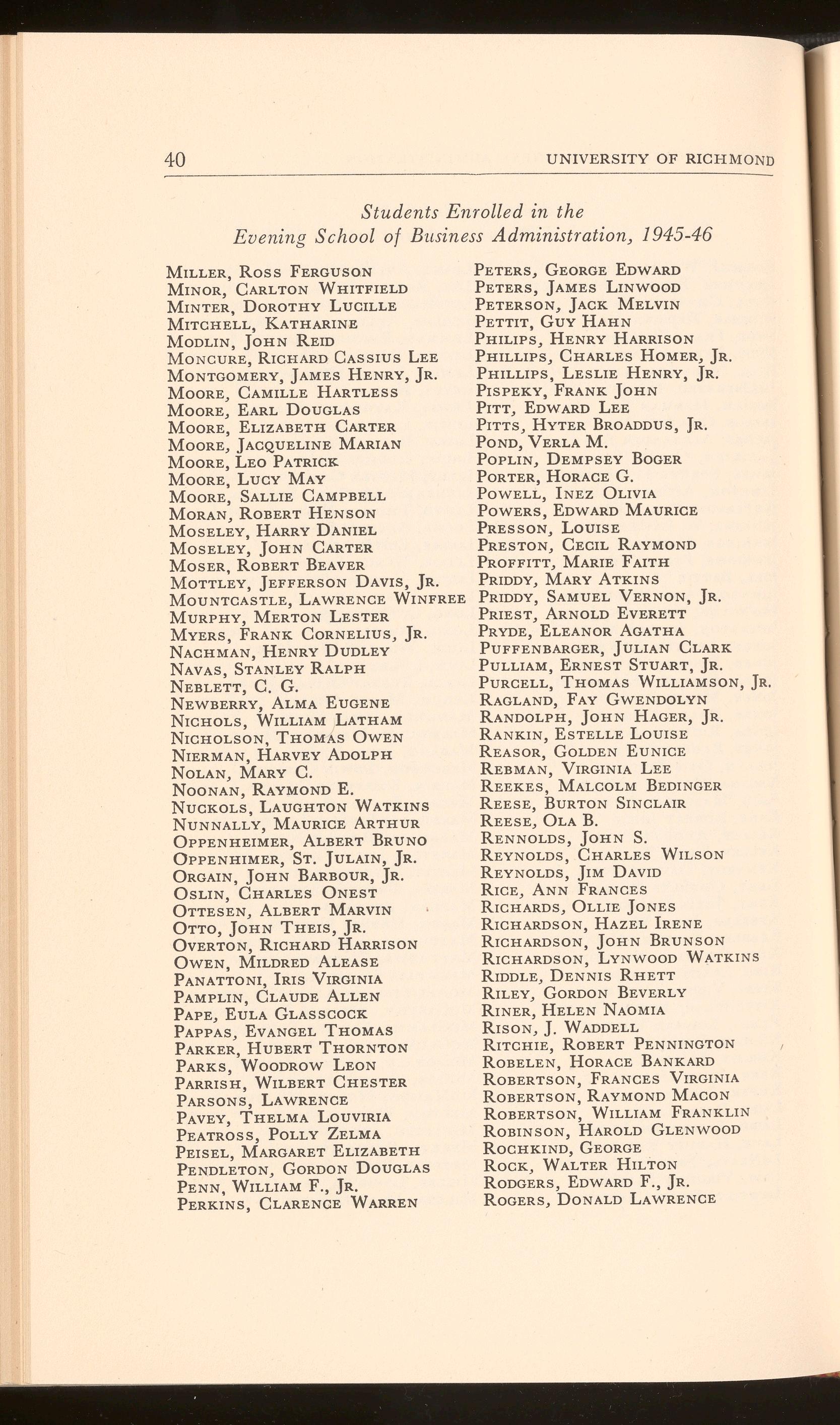
PETERS, GEORGE EDWARD
PETERS, JAMES LINWOOD
PETERSON, JACK MELVIN
PETTIT, Guy HAHN
PHILIPS, HENRY HARRISON
PHILLIPS, CHARLES HOMER, JR. PHILLIPS, LESLIE HENRY, JR. PISPEKY, FRANK JOHN
PITT, EDWARD LEE
PITTS, HYTER BROADDUS, JR.
POND, VERLA M.
POPLIN, DEMPSEY BOGER
PORTER, HORACE G.
POWELL, INEZ OLIVIA
POWERS, EDWARD MAURICE
PRESSON, LOUISE
PRESTON, CECIL RAYMOND
PROFFITT, MARIE FAITH
PRIDDY, MARY ATKINS
PRIDDY, SAMUEL VERNON, JR.
PRIEST, ARNOLD EVERETT
PRYDE, ELEANOR AGATHA
PUFFENBARGER, JULIAN CLARK
PULLIAM, ERNEST STUART, JR
PURCELL, THOMAS WILLIAMSON, JR.
RAGLAND, FAY GWENDOLYN
RANDOLPH, JOHN HAGER, JR
RANKIN, ESTELLE LOUISE
REASOR, GOLDEN EUNICE
REBMAN, VIRGINIA LEE
REEKES, MALCOLM BEDINGER
REESE, BURTON SINCLAIR
REESE, OLA B.
RENNOLDS, JOHN S REYNOLDS, CHARLES WILSON
REYNOLDS, JIM DAVID
RICE, ANN FRANCES
RICHARDS, OLLIE JONES
RICHARDSON, HAZEL IRENE
RICHARDSON, JOHN BRUNSON
RICHARDSON, LYNWOOD WATKINS
RIDDLE, DENNIS RHETT
RILEY, GORDON BEVERLY
RINER, HELEN NAOMIA
RISON, J. WADDELL
RITCHIE, ROBERT PENNINGTON
ROBELEN, HORACE BANKARD
ROBERTSON, FRANCES VIRGINIA
ROBERTSON, RAYMOND MACON
ROBERTSON, WILLIAM FRANKLIN
ROBINSON, HAROLD GLENWOOD
RocHKIND, GEORGE
RocK, WALTER HILTON
RODGERS, EDWARD F., JR
ROGERS, DONALD LAWRENCE
Students Enrolled in the Evening School of Business Administration, 1945-46
ROSENBAUM, WALTON LEE
Ross, RoBERT ANTHONY
ROTHWELL, HAROLD ELMER
RUFTY, BOYCE REITZEL
RUNGE, EMIL, SR. RYAN, ANDREW SHELTON
ST. JOHN, VIRGIL WASHINGTON
SADLER, LOUISE S.
SAMUELS, CARLEASE LYELL
SATTERFIELD, CALVIN
SAUER, LESTER MARTIN SAUNDERS, HOLMAN
SAWYER, WILLIAM LOCKWOOD SCHERMERHORN, EGMONT ].
SCHERMERHORN, MARGARET ANNE
SCHULTHEIS HARRY DOUGLAS
SCOTT, BETTY HART
SCOTT, WILLARD LAWRENCE
SELPH, JOHN ARCHER, ]R. SHANDS, ARTHUR DANIEL
SHAW, CHARLES HENRY
SHEEHAN, HAROLD THOMAS
SHELBURNE, WILLIAM C.
SHELDON, LUTHER PITZER
SHELTON, JOSEPH MOSBY
SHEPARD, MILDRED V.
SHEPPARD, MYRON WINFREE
SHERROD, CHARLES HAYWOOD, JR. SHIELDS, C. P.
SHULTZ, LAWRENCE EDMOND
SHUMAN, HELEN GORDON
SHUMATE, JESSE DANIEL
SILER, J. HAMMOND, JR. SIMS, VIRGINIA
SINCLAIR, ROSE MAE
SMITH, ALLAN RANDOLPH
SMITH, ANNIE ESTELLE
SMITH, GERALDINE VERNON
SMITH, GLADYS LUCILLE
SMITH, LUTHER HENRY
SMITH, :MARY LEIGHTON
SMITH, OSCAR JACKSON
SMITH, PEARL MARIE
SMITH, PERCY MOSELEY, JR.
SMITH, RAMON GARNETT
SMITHER, EDWARD NEWTON, JR. SNELLINGS, HENRY LOZIER, ]R. SNOW, ]OHN EDWARD, JR. SOMMERS, HARRY J.
SOURS, MARVIN CLIFTON
SOWERS, ]AMES ROBERT SPINELLA, NICHOLAS ANTHONY STALEY, RICHARD ARTHUR
STANSBURY, LESLIE T., JR. STARKE, WM. MEADE
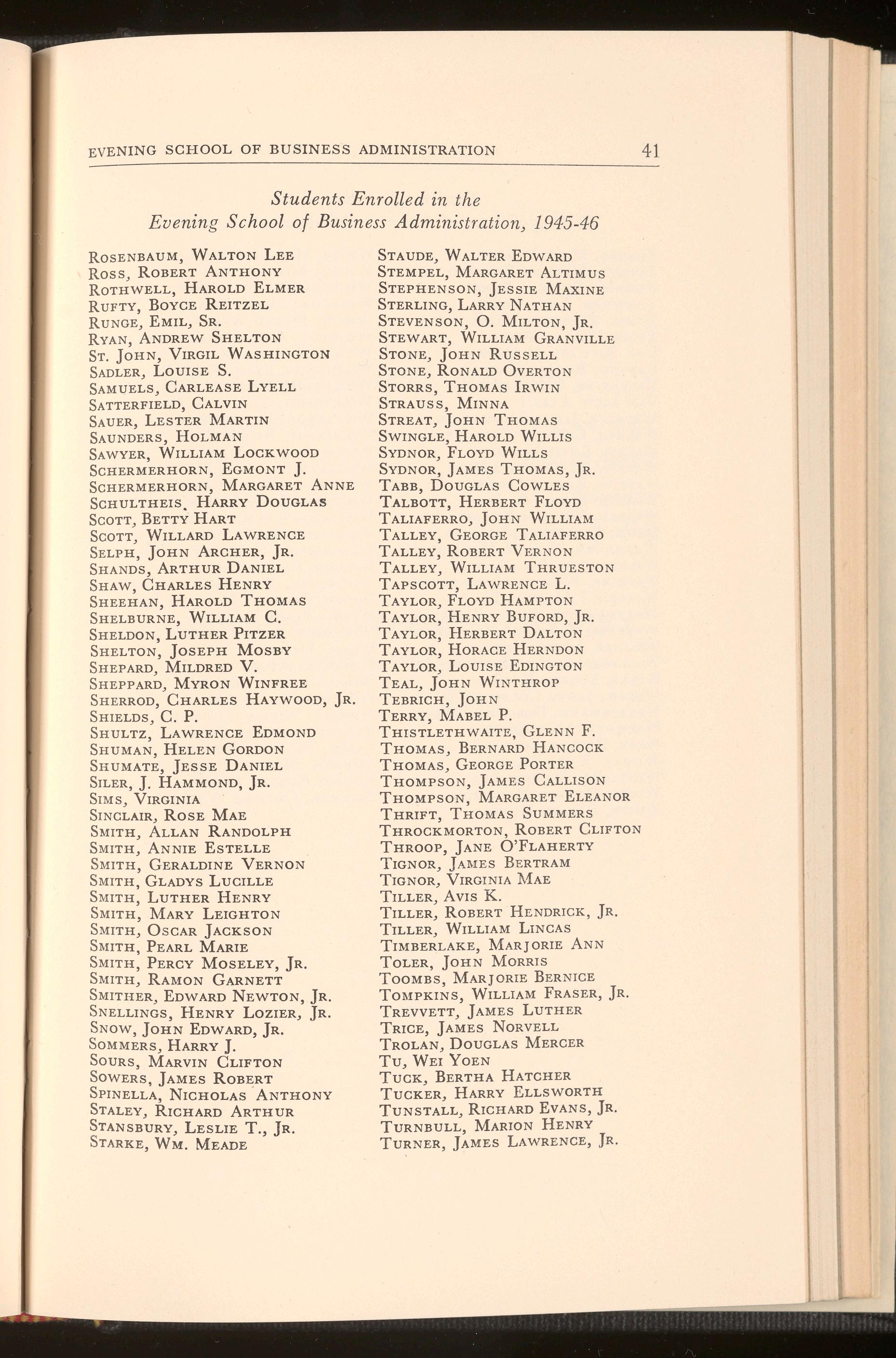
STAUDE, WALTER EDWARD
STEMPEL, MARGARET ALTIMUS
STEPHENSON, ]ESSIE MAXINE
STERLING, LARRY NATHAN
STEVENSON, 0. MILTON, JR.
STEWART, WILLIAM GRANVILLE
STONE, JOHN RussELL
STONE, RONALD OVERTON
STORRS, THOMAS IRWIN
STRAUSS, MINNA
STREAT, JOHN THOMAS
SWINGLE, HAROLD WILLIS
SYDNOR, FLOYD WILLS
SYDNOR, ]AMES THOMAS, JR.
TABB, DOUGLAS COWLES
TALBOTT, HERBERT FLOYD
TALIAFERRO, JOHN WILLIAM
TALLEY, GEORGE TALIAFERRO
TALLEY, ROBERT VERNON
TALLEY, WILLIAM THRUESTON
TAPSCOTT, LAWRENCE L.
TAYLOR, FLOYD HAMPTON
TAYLOR, HENRY BUFORD, JR.
TAYLOR, HERBERT DALTON
TAYLOR, HORACE HERNDON
TAYLOR, LOUISE EDINGTON
TEAL, JOHN WINTHROP
TEBRICH, JOHN
TERRY, MABEL P.
THISTLETHWAITE, GLENN F.
THOMAS, BERNARD HANCOCK
THOMAS, GEORGE PORTER
THOMPSON, ]AMES CALLISON
THOMPSON, MARGARET ELEANOR
THRIFT, THOMAS SUMMERS
THROCKMORTON, ROBERT CLIFTON
THROOP, ]ANE O'FLAHERTY
TIGNOR, JAMES BERTRAM
TIGNOR, VIRGINIA l\1AE
TILLER, Avrs K.
TILLER, ROBERT HENDRICK, JR.
TILLER, WILLIAM LINCAS
TIMBERLAKE, MARJORIE ANN
TOLER, JOHN MORRIS
TOOMBS, MARJORIE BERNICE
TOMPKINS, WILLIAM FRASER, JR.
TREVVETT, JAMES LUTHER
TRICE, JAMES NORVELL
TROLAN, DOUGLAS MERCER
Tu, WEI YoEN
TUCK, BERTHA HATCHER
TUCKER, HARRY ELLSWORTH
TUNSTALL, RICHARD EVANS, JR.
TURNBULL, MARION HENRY
TURNER, ]AMES LAWRENCE, JR.
UNIVERSITY OF RICHMOND
Students Enrolled in the Evening School of Business Administration, 1945-46
TURNER, MARY BUNGER
TURNER, NORMAN BERNARD
TURNER, THOMAS ELMO
TUTWILER, EDNA LOUISE
TYLER, FREDERICK MEREDITH
TYLER, WILBUR TYREE
UPP, R1cHARD McCLURE
URBACH, ROBERT GRAY
VALENTINE, EARL LESTER
VAN LIEW, LESLIE
WADKINS, JAMES THOMAS, JR,
WALKER, CAROLYN FRANCES
WALSH, RUTH NELSON
WARREN, MARGARET LOUISE
WARREN, RAMON ELDRIDGE
WARREN, RAMONE., JR.
WARREN, WILLIAM RUSSELL
VVASH, CYRENIOUS CARLTON
WASHBURN, GEORGE MANLEY, JR.
WAsSERSTEIN, lsY GoRDON
WATKINS, WARNER MERIWETHER
WATSON, J. MARVIN, JR.
WEATHERFORD, ELLEN THERESA
WEBSTER, THEODORE MEREDITH
WEISNER, LOUIS AUGUST
WELLFORD, LOUIS MATTHEZ, JR.
WELLS, EUGENE HERMAN
WELSH, JAMES COLEMAN, JR.
\"vESTERMANN, DOROTHEA MARIE
WERMUTH, MARY JOYCE
WEST, DUDLEY ROGERS
WHEAT, JAMES CLIFTON
WHITAKER, BERNICE EVA
WHITE, DONALD HAMILTON
WHITE, GERALD HUBERT
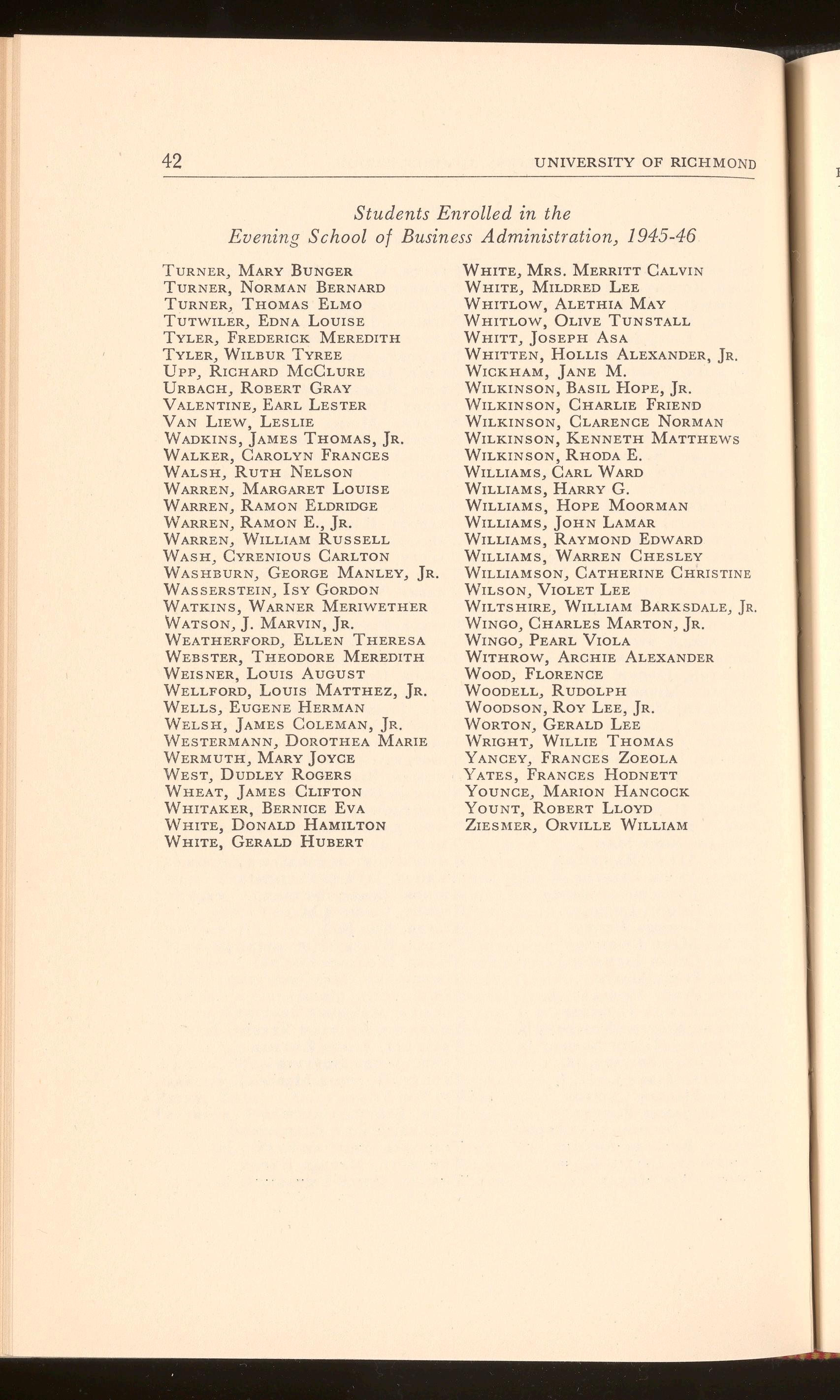
WHITE, MRS. MERRITT CALVIN
WHITE, MILDRED LEE
WHITLOW, ALETHIA MAY
WHITLOW, OLIVE TUNSTALL
WHITT, JOSEPH ASA
WHITTEN, HOLLIS ALEXANDER, JR, WICKHAM, JANE M.
WILKINSON, BASIL HOPE, JR.
WILKINSON, CHARLIE FRIEND
WILKINSON, CLARENCE NORMAN
WILKINSON, KENNETH MATTHEWS
WILKINSON, RHODA E.
WILLIAMS, CARL WARD
WILLIAMS, HARRY G.
WILLIAMS, HOPE MOORMAN
WILLIAMS, JOHN LAMAR
WILLIAMS, RAYMOND EDWARD
WILLIAMS, WARREN CHESLEY
WILLIAMSON, CATHERINE CHRISTINE
WILSON, VIOLET LEE
WILTSHIRE, WILLIAM BARKSDALE, ]R
WINGO, CHARLES MARTON, JR.
WINGO, PEARL VIOLA
WITHROW, ARCHIE ALEXANDER
WooD, FLORENCE
WOODELL, RUDOLPH
WOODSON, RoY LEE, JR.
WORTON, GERALD LEE
WRIGHT, WILLIE THOMAS
YANCEY, FRANCES ZOEOLA
YATES, FRANCES HODNETT
YOUNCE, MARION HANCOCK
YOUNT, ROBERT LLOYD
ZIESMER, ORVILLE WILLIAM
SCHOLARSHIPS AWARDED, _TUNE IC)46
JACQUELINE MARIAN MOORE
ANNE HILL FLIPPIN
JOHN FRANKLYN DEW
RAMON GARNETT SMITH
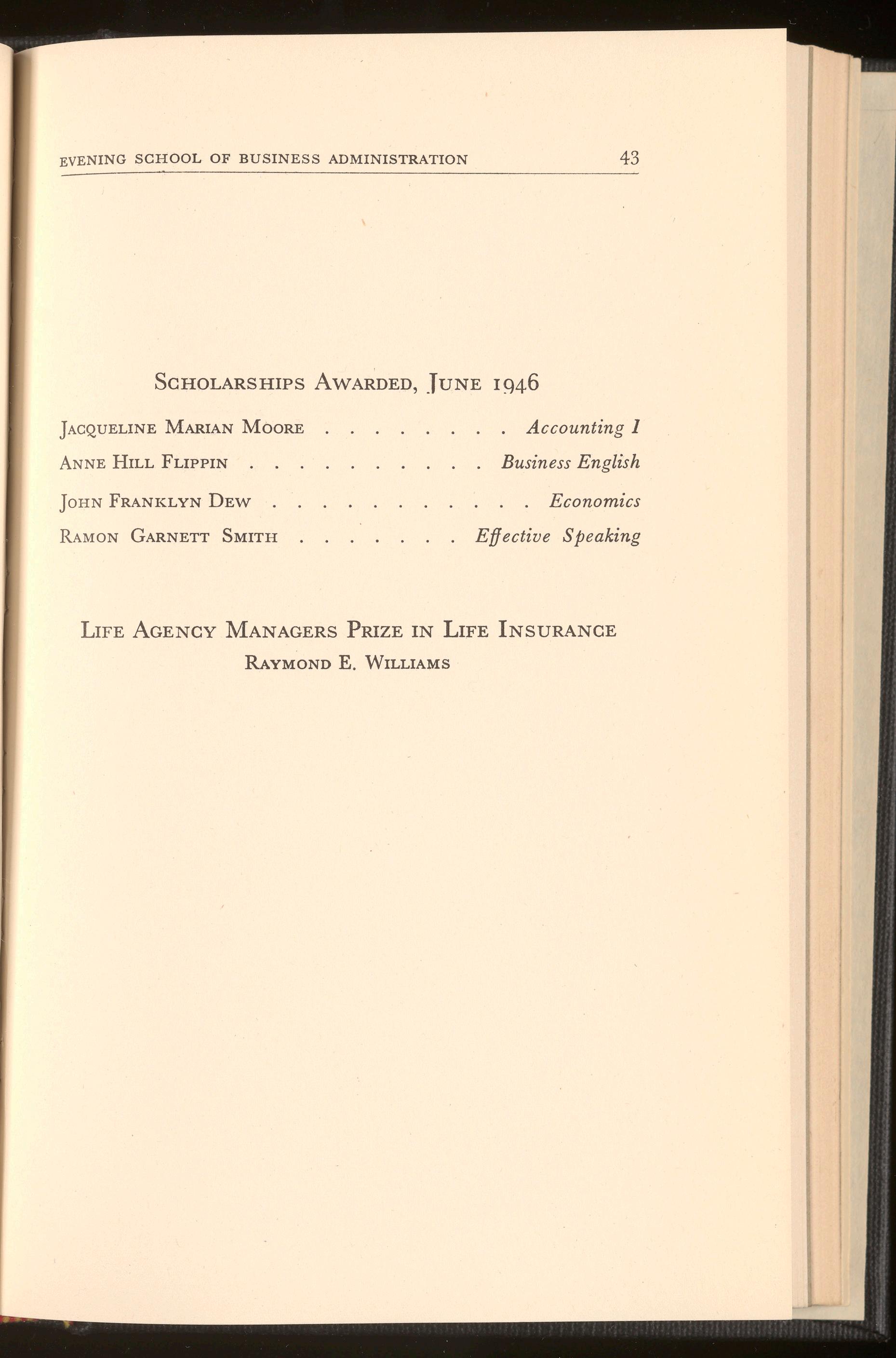
Accounting I Business English Economics Effective Speaking
LIFE AGENCY MANAGERS PRIZE IN LIFE INSURANCE
RAYMOND E . WILLIAMS




